#i feel like its more of an analysis
Text
in the nicest and most non-confrontational way possible. i feel like some of you think that anything that isn't directly openly spelled out for you within a story is "missed potential" or "unexplored." like. sometimes there are implied narratives. sometimes the point is that you as the reader are supposed to think and draw your own conclusions and participate in the story. the writers not directly spelling every little detail out for you doesn't mean that the story is poorly written or missed its own plot details somehow. PLEASE.
#if i get one more comment referring to zelda's draconification as wasted potential im going to lose it for real#that's not unexplored potential that is THE ENTIRE STORY. JUST BECAUSE THEY DONT BEAT YOU OVER THE HEAD WITH IT DOESNT MEAN ITS NOT THERE#i get this all the time with just like. link's trauma in general too.#like people will ask me 'do you think they should explore link's trauma more' and im like. they do#that's what the games are about. it's all there. they just don't directly state that that's what they're doing because theyre expecting you#as a reader to ENGAGE WITH THE DAMN TEXT BEYOND SURFACE LEVEL. UGHHHHHHH#WHATEVER. whatever#like i feel like some of you would read the great gatsby and be like#'there was a lot of missed potential to talk about the failure of the american dream' GIRL IT'S RIGHT THERE. JUST THINK A LITTLE#personal#and yeah obviously its not that deep its a video game but like. i am not making shit up when i write my comics and analysis.#I AM ENGAGING WITH THE TEXT. AS IS GENERALLY EXPECTED OF A READER#ugh ok whatever. im done now sorry
658 notes
·
View notes
Text
Double Indemnity, Veritas Ratio and Aventurine

This was originally a part of my compilation post as a short analysis on the Double Indemnity references, linking to this great thread by Manya on Twitter. However, I've recently watched the movie and found that the parallels run much deeper than just the mission name and the light cone itself, plus as the short synopsis I've read online. Since there isn't really an in-depth attempt at an analysis on the film in relation to the way Aventurine and Ratio present themselves throughout Penacony, I thought I'd take a stab at doing just that. I will also be bringing up things from Manya's thread as well as another thread that has some extra points.
Disclaimer that I... don't do analyses very often. Or write, in general — I'm someone who likes to illustrate their thoughts (in the artistic sense) more than write. There's just something about these two that makes me want to rip into them so badly, so here we are. If there's anything you'd like to add or correct me on, feel free to let me know in the replies or reblogs, or asks. This ended up being a rather extensive deep dive into the movie and its influences on the pairing, so please keep that in mind when pressing Read More.
There are two distinct layers on display in Ratio and Aventurine's relationship throughout Penacony, which are references to the two most important relationships in the movie — where they act like they hate/don’t know each other, and where they trust each other.
SPOILER WARNING for the entire movie, by the way. You can watch the film for free here on archive.org, as well as follow along with the screenplay here. I will also be taking dialogue and such from the screenplay, and cite quotes from the original novel in its own dedicated section. SPOILER WARNING for the Cat Among Pigeons Trailblaze mission, as well.

CONTENT WARNING FOR MENTIONS OF SUICIDE. YOU HAVE BEEN WARNED.
To start, Double Indemnity (1944) is a film noir by Billy Wilder (and co-written by Raymond Chandler) based on the novel of the same name by James M. Cain (1927). There are stark differences between the movie adaptation and the original novel which I will get into later on in this post, albeit in a smaller section, as this analysis is mainly focused on the movie adaptation. I will talk about the basics (summaries for the movie and the game, specifically the Penacony mission in tandem with Ratio and Aventurine) before diving into the character and scene parallels, among other things.

—
[THE NAME]
The term "double indemnity" is a clause in which if there’s a case of accidental death of a statistically rare variety, the insurance company has to pay out multiple of the original amount. This excludes deaths by murder, suicide, gross negligence, and natural causes.

The part of the mission in Cat Among Pigeons where Ratio and Aventurine meet with Sunday is named after the movie. And before we get further into things, let's get this part out of the way: The Chinese name used in the mission is the CN title of the movie, so there's no liberties taken with the localization — this makes it clear that it’s a nod to the movie and not localization doing its own thing like with the mission name for Heaven Is A Place On Earth (EN) / This Side of Paradise (人间天堂) (CN).

—
[SUMMARY OF THE 1944 MOVIE]
Here I summarised the important parts that will eventually be relevant in the analysis related to the game.

Insurance salesman Walter Neff, wounded from a gunshot, enters his office and confesses his crime on a dictaphone to his boss Barton Keyes, the claims manager. Much earlier, he had met Phyllis Dietrichson, the wife of Mr. Dietrichson and former nurse. Neff had initially wanted to meet Mr. Dietrichson because of car insurance. Phyllis claims her husband is mean to her and that his life insurance goes to his daughter Lola. With Neff seduced by Phyllis, they eventually brew up a scheme to murder Mr. Dietrichson in such a way that they activate the "double indemnity" clause, and the plan goes off almost perfectly. Initially, the death is labeled a suicide by the president of the company, Norton.
Keyes finds the whole situation suspicious, and starts to suspect Phyllis may have had an accomplice. The label on the death goes from accidental, to suicide, to then murder. When it’s ruled that the husband had no idea of the accidental policy, the company refuses to pay. Neff befriends Phyllis’ stepdaughter Lola, and after finding out Phyllis may have played a part in the death of her father’s previous wife, Neff begins to fear for Lola and himself, as the life insurance would go all towards her, not Phyllis.
After the plan begins to unravel as a witness is found, it comes out that Lola’s boyfriend Nino Zachette has been visiting Phyllis every night after the murder. Neff goes to confront Phyllis, intending to kill her. Phyllis has her own plans, and ends up shooting him, but is unable to fire any more shots once she realises she did love him. Neff kills her in two shots. Soon after telling Zachette not to go inside the house, Neff drives to his office to record the confession. When Keyes arrives, Neff tells him he will go to Mexico, but he collapses before he could get out of the building.
—
[THE PENACONY MISSION TIMELINE]

I won’t be summarising the entirety of Aventurine and Ratio’s endeavours from the beginning of their relationship to their final conversation in Heaven Is A Place On Earth the same way as I summarised the plot of the movie, so I will instead present a timeline. Bolded parts means they are important and have clear parallels, and texts that are in [brackets] and italics stand for the names of either the light cone, or the mission names.
[Final Victor] Their first meeting. Ratio’s ideals are turned on its head as he finally meets his match.
Several missions happen in-between their first encounter and the Penacony project. They come to grow so close and trusting with each other that they can guess, understand each other’s thoughts, way of thinking and minds even in high stakes missions. Enough to pull off the Prisoner’s Dilemma (Aventurine’s E1) and Stag Hunt Game (Aventurine’s E6) and come out on top.
Aventurine turns towards Ratio for assisting him in the Penacony project. Ratio's involvement in the project is implied to be done without the knowledge of Jade, Topaz, and the IPC in general, as he was only sent to Penacony to represent the Intelligentsia Guild, and the two other Stonehearts never mention Ratio.
Aventurine and Ratio cook up the plan to deceive Sunday before ever setting foot on Penacony. Aventurine does not tell Ratio the entirety of his plan.
Aventurine convinces Topaz and Jade to trust him with their Cornerstones. Aventurine also breaks his own Cornerstone and hides it along with the jade within a bag of gift money.
[The Youth Who Chase Dreams] They enter Penacony in the Reverie Hotel. Aventurine is taken to the side by Sunday and has all his valuables taken, which includes the gift money that contains the broken aventurine stone, the jade, and the case containing the topaz.
Aventurine and Ratio speak in a “private” room about how Aventurine messed up the plan. After faking an argument to the all-seeing eyes of Sunday, Ratio leaves in a huff.
Ratio, wearing his alabaster head, is seen around Golden Hour in the (Dusk) Auction House by March 7th.
[Double Indemnity] Ratio meets up with Sunday and “exposes” Aventurine to him. Sunday buys his “betrayal”, and is now in possession of the topaz and jade. Note that this is in truth Ratio betraying Sunday all along.
Ratio meets up with Aventurine again at the bar. Ratio tells Aventurine Sunday wants to see him again.
They go to Dewlight Pavilion and solve a bunch of puzzles to prove their worth to Sunday.
They meet up with Sunday. Sunday forces Aventurine to tell the truth using his Harmony powers. Ratio cannot watch on. It ends with Aventurine taking the gift money with his Cornerstone.
[Heaven Is A Place On Earth] They are in Golden Hour. Ratio tries to pry Aventurine about his plan, but Aventurine reins him in to stop breaking character. Ratio gives him the Mundanite’s Insight before leaving. This is their final conversation before Aventurine’s grandest death.
Now how exactly does the word “double indemnity” relate to their mission in-game? What is their payout? For the IPC, this would be Penacony itself — Aventurine, as the IPC ambassador, handing in the Jade Cornerstone as well as orchestrating a huge show for everybody to witness his death, means the IPC have a reason to reclaim the former prison frontier. As for Ratio, his payout would be information on Penacony’s Stellaron, although whether or not this was actually something he sought out is debatable. And Aventurine? It’s highly implied that he seeks an audience with Diamond, and breaking the Aventurine Cornerstone is a one way trip to getting into hot water with Diamond. With Aventurine’s self-destructive behaviour, however, it would also make sense to say that death would be his potential payout, had he taken that path in the realm of IX.
Compared to the movie, the timeline happens in reverse and opposite in some aspects. I will get into it later. As for the intended parallels, these are pretty clear and cut:
Veritas Ratio - Walter Neff
Aventurine - Phyllis Dietrichson
Sunday - Mr. Dietrichson

There is one other character who I feel also is represented in Ratio, but I won’t bring them up until later down the line.
For the sake of this analysis, I won’t be exploring Sunday’s parallel to Mr. Dietrichson, as there isn’t much on Dietrichson’s character in the first place in both the movie and the novel. He just kind of exists to be a bastard that is killed off at the halfway point. Plus, the analysis is specifically hyper focused on the other two.
—
[SO, WHAT’S THE PLAN?]
To make things less confusing in the long run whenever I mention the words “scheme” and “plan”, I will be going through the details of Phyllis and Neff’s scheme, and Aventurine and Ratio’s plan respectively. Anything that happens after either pair separate from another isn’t going to be included. Written in a way for the plans to have gone perfectly with no outside problems.

Phyllis and Neff —> Mr. Dietrichson
Goal: Activate the double indemnity clause by killing Mr. Dietrichson and making it look like a freak train accident
Payout: Twice or more of the face value of the life insurance ($100,000)
Main Actor: Walter Neff | Accomplice: Phyllis Dietrichson
During the entire time until the payout, Phyllis and Neff have to make sure to any outsiders that they look like complete strangers instead of lovers in an affair.
Step-by-step:
Neff convinces Mr. Dietrichson to sign the policy with the clause without him suspecting foul play, preferably with a third party to act as an alibi. This is done discreetly, making Mr. Dietrichson not read the policy closely and being told to just sign.
Neff and Phyllis talk to each other about small details through the phone (specified to be never at Phyllis’ own house and never when Neff was in his office) and in the marketplace only, to make their meetings look accidental. They shouldn’t be seen nor tracked together, after all.
Phyllis asks Mr. Dietrichson to take the train. She will be the one driving him to the train station.
On the night of the murder, after making sure his alibi is airtight, Neff sneaks into their residence and hides in their car in the second row seating, behind the front row passenger seat. He wears the same colour of clothes as Mr. Dietrichson.
Phyllis and Mr. Dietrichson get inside the car — Phyllis in the driver’s seat and Mr. Dietrichson in the passenger seat. Phyllis drives. On the way to the train station, she makes a detour into an alley. She honks the horn three times.
After the third honk, Neff breaks Mr. Dietrichson’s neck. The body is then hidden in the second row seating under a rug.
They drive to the train station. Phyllis helps Neff, now posing as Mr. Dietrichson, onto the train. The train leaves the station.
Neff makes it to the observation platform of the parlour car and drops onto the train tracks when nobody else is there.
Phyllis is at the dump beside the tracks. She makes the car blink twice as a signal.
The two drag Mr. Dietrichson’s corpse onto the tracks.
They leave.
When Phyllis eventually gets questioned by the insurance company, she pretends she has no idea what they are talking about and eventually storms off.
Phyllis and Neff continue to lay low until the insurance company pays out.
Profit!
Actual Result: The actual murder plan goes almost smoothly, with a bonus of Mr. Dietrichson having broken a leg. But with him not filing a claim for the broken leg, a witness at the observation platform, and Zachette visiting Phyllis every night after the murder, Keyes works out the murder scheme on his own, but pins the blame on Phyllis and Zachette, not Neff.

Now for Aventurine and Ratio. You can skip this section if you understand how deep their act goes, but to those who need a refresher, here’s a thorough explanation:
Aventurine and Ratio —> Sunday
Goal: Collect the aventurine stone without Sunday knowing, ruin the dream (and create the grandest death)
Payout: Penacony for the IPC, information on the Stellaron for Ratio, a meeting with Diamond / death for Aventurine
Main Actor: Aventurine | Accomplice: Veritas Ratio
From the moment they step onto Penacony, they are under Sunday’s ever present and watchful eyes. “Privacy” is a foreign word to The Family. They have to act like they don’t like each other’s company the entire time and feed Sunday information through indirect means so that the eventual “betrayal” by Ratio seems truthful to Sunday. Despite what it looks like, they are closer than one would ever think, and Ratio would never sell out a person purely for information.
Step-by-step:
After Sunday takes away the bag of gift money and box, Aventurine and Ratio talk in a room in the Reverie Hotel.
Aventurine establishes the Cornerstones’ importance, and how he lost the gift money and the case containing the Cornerstones to Sunday. Ratio turns to leave, saying “some idiot ruined everything”, meaning the Cornerstones were vital to their plan. (Note that Ratio is not wearing his alabaster head while saying it to said “idiot”.)
Aventurine then proceeds to downplay the importance of the Cornerstones, stating they are “nothing more than a few rocks” and “who cares if they are gone”. This lets Sunday know that something suspicious may be going on for him to act like it’s nothing, and the mention of multiple stones, and leaves him to look up what a Cornerstone is to the Ten Stonehearts of the IPC.
Ratio points out his absurd choice of outfit, mentioning the Attini Peacock and their song.
Ratio implies that without the aventurine stone, he is useless to the IPC. He also establishes that Aventurine is from Sigonia(-IV), and points out the mark on his neck. To Sunday, this means that Aventurine is shackled to the IPC, and how Aventurine may possibly go through extreme lengths to get the stone back, because a death sentence always looms above him.
Aventurine claims Ratio had done his homework on his background, which can be taken that this is their very first time working together. (It isn’t, and it only takes one look to know that Aventurine is an Avgin because of his unique eyes, so this comment does not make sense even in a “sincere” way, a running theme for the interaction.)
Ratio mentions how the true goal is to reclaim Penacony for the IPC, establishing their ulterior motive for attending the banquet.
Ratio asks if Aventurine went to pre-school in Sigonia after saying trust was reliant on cooperation. Aventurine mentions how he didn’t go to school and how he doesn’t have any parents. He even brings up how friends are weapons of the Avgins. This tells Sunday that the Avgins supposedly are good at manipulation and potentially sees Ratio possibly betraying Aventurine due to his carelessness with his “friends”. Sunday would also then research about the Avgins in general (and research about Sigonia-IV comes straight from the Intelligentsia Guild.)
Ratio goes to Dewlight Pavilion in Sunday’s Mansion and exposes a part of Aventurine’s “plan”. When being handed the suitcase, Ratio opens it up due to his apparent high status in the IPC. He tells Sunday that the Cornerstone in the suitcase is a topaz, not an aventurine, and that the real aventurine stone is in the bag of gift money. This is a double betrayal — on Aventurine (who knows) and Sunday (who doesn’t). Note that while Ratio is not officially an IPC member in name — the Intelligentsia Guild (which is run by the IPC head of the Technology Department Yabuli) frequently collaborates with the IPC. Either Aventurine had given him access to the box, or Ratio’s status in general is ambiguous enough for Sunday not to question him further. He then explains parts of Aventurine’s gamble to Sunday in order to sell the betrayal. Note that Ratio does not ever mention Aventurine’s race to Sunday.
Ratio brings Aventurine to Sunday. Aventurine offers help in the investigation of Robin's death, requesting the gift money and the box in return.
Sunday objects to the trade offer. Aventurine then asks for just the bag. A classic car insurance sales tactic. Sunday then interrogates Aventurine, and uses everything Ratio and Aventurine brought up in the Reverie Hotel conversation and their interactions in the Mansion, as well as aspects that Ratio had brought up to Sunday himself.
Aventurine feigns defeat and ignorance enough so that Sunday willingly lets him go with the gift bag. After all is said and done, Aventurine leaves with the gift money, where the Aventurine Cornerstone is stored all along.
Ratio and Aventurine continue to pretend they dislike each other until they go their separate ways for their respective goals and plans. Aventurine would go on to orchestrate his own demise at the hands of Acheron, and Ratio… lurks in the shadows like the owl he is.
Profit!
Actual Result: The plan goes perfectly, even with minor hiccups like Ratio coming close to breaking character several times and Aventurine being sentenced to execution by Sunday.
This is how Sunday uses the information he gathered against Aventurine:
• Sunday going on a tirade about the way Aventurine dresses and how he’s not one to take risks — Ratio’s comment about Aventurine’s outfit being peacock-esque and how he’s “short of a feather or two”.
• “Do you own a Cornerstone?” — Ratio talked about the aventurine stone.
• “Did you hand over the Cornerstone to The Family when you entered Penacony?” — Aventurine mentioned the box containing the Cornerstones.
• “Does the Cornerstone you handed over to The Family belong to you?” — Aventurine specifically pluralized the word Cornerstone and “a bunch of rocks” when talking to Ratio.
• “Is your Cornerstone in this room right now?” — The box in the room supposedly contained Aventurine’s own cornerstone, when Aventurine mentioned multiple stones.
• “Are you an Avgin from Sigonia?” —Aventurine mentioned that he’s an Avgin, and Ratio brought up Sigonia.
• “Do the Avgins have any ability to read, control, and manipulate one’s own or another’s minds?” — Aventurine’s comment on how friends are weapons, as well as Sunday’s own research on the Avgins, leading him to find out about the negative stereotypes associated with them.
• “Do you love your family more than yourself?” — His lost parents.
“All the Avgins were killed in a massacre. Am I right?” — Based on Sunday’s research into his background.
• “Are you your clan’s sole survivor?” — Same as the last point.
“Do you hate and wish to destroy this world with your own hands?” — Ratio mentioned the IPC’s goal to regain Penacony, and Aventurine’s whole shtick is “all or nothing”.
• “Can you swear that at this very moment, the aventurine stone is safe and sound in this box?” — Repeat.
As seen here, both duos have convoluted plans that involve the deception of one or more parties while also pretending that the relationship between each other isn’t as close as in reality. Unless you knew both of them personally and their histories, there was no way you could tell that they have something else going on.
On to the next point: Comparing Aventurine and Ratio with Phyllis and Neff.
—
[NEFF & PHYLLIS — RATIO & AVENTURINE]

With the short summaries of the movie and the mission out of the way, let’s look at Phyllis and Neff as characters and how Aventurine and Ratio are similar or opposite to them.

Starting off with Aventurine and Phyllis. Here is where they are the most similar:
Phyllis is blonde and described as a provocative woman. Aventurine is also a blond and eyes Ratio provocatively in the Final Victor light cone.
Phyllis was put under surveillance after Keyes starts figuring out that the so-called accidental death/suicide may have been a murder after all. Similarly, Aventurine was watched by Sunday the entire time in Penacony.
Phyllis never tells Neff how she's seeing another man on the side to possibly kill him too (as well as how she was responsible for the death of her husband‘s previous wife). Aventurine also didn't tell Ratio the entirety of his plan of his own death.
Phyllis puts on a somewhat helpless act at first but is incredibly capable of making things go her way, having everything seemingly wrapped around her finger. Aventurine — even when putting on a facade that masks his true motives — always comes out at the top.
Now the differences between Aventurine and Phyllis:
Phyllis does not care about her family and has no issue with killing her husband, his previous wife, and possibly her daughter Lola. Opposite of that, Aventurine is a family man… with no family left, as well as feeling an insane level of survivor’s guilt.
Really, Phyllis just… does not care at all about anyone but herself and the money. Aventurine, while he uses every trick in the book to get out on top, does care about the way Jade and Topaz had entrusted him with their Cornerstones, in spite of the stones being worth their lives.
Phyllis also uses other people to her advantage to get what she wants, often behind other people's backs, with the way she treats Neff and Zachette. Aventurine does as well (what with him making deals with the Trailblazer while also making a deal with Black Swan that involves the Trailblazer). The difference here is Phyllis uses her allure deliberately to seduce men while Aventurine simply uses others as pawns while also allowing others to do the same to himself.
Phyllis makes no attempt at compromising the policy when questioned by Norton. Aventurine ends up compromising by only taking the gift money (which is exactly what he needs).
The wig that Barbara Stanwyck (the actress of Phyllis) wore was chosen to make her look as “sleazy” as possible, make her look insincere and a fraud, a manipulator. A sort of cheapness. Aventurine’s flashy peacock-esque outfit can be sort of seen as something similar, except the outfit isn’t cheap.

Moving on to Ratio’s similarities to Neff… There isn’t much to extrapolate here as Ratio is more of a side character in the grand scheme of Penacony, however this is what I’ve figured out.
Neff has dark hair. Ratio has dark purple hair.
Neff almost never refers to Phyllis by her name when speaking with her, only as “baby”. The few times he refers to her as Phyllis or Mrs. Dietrichson is during their first conversations and when he has to act like he doesn’t know her. Ratio never calls Aventurine by his name when he’s around him — only as “gambler”, sometimes “damned” or “dear” (EN-only) gambler. Only in the Aventurine's Keeping Up With Star Rail episode does Ratio repeatedly say his name, and yet he still calls him by monikers like “gambler” or, bafflingly, a “system of chaos devoid of logic”.
Both Neff and Ratio committed two betrayals: Neff on Mr. Dietrichson and Keyes, and Ratio on Sunday and Aventurine. With the former cases it was to reach the end of the trolley line, and with the latter it was on a man who had put his trust in him.
As for the differences…
Neff is described as someone who’s not smart by his peers. Ratio is someone who is repeatedly idolised and put on a pedestal by other people.
Neff is excellent at pretending to not know nor care for Phyllis whenever he speaks about her with Keyes or when he and she are in a place that could land them in hot water (the office, the mansion when there are witnesses). His acting is on the same level as Phyllis. With Ratio it’s… complicated. While he does pull off the hater act well, he straight up isn’t great at pretending not to care about Aventurine’s wellbeing.
Instead of getting his gunshot wound treated in the hospital like a normal person, Neff makes the absolutely brilliant decision of driving to his office and talking to a dictaphone for hours. Needless to say, this is something a medical doctor like Ratio would never do.

Now here's the thing. Though it's very easy to just look at Phyllis and Neff in the movie and go "okay, Aventurine is Phyllis and Ratio is Neff — end of story" and leave it at that, I find that they both take from the two leads in different ways. Let me explain. Beginning with Aventurine and Neff…
Neff is the one who hatches the plan and encourages Phyllis to go through and claim the double indemnity clause in the first place. He is also the key player of his own risky plan, having to fake being the husband to enter the train as well as fake the death. Aventurine puts himself at great risk just by being in Sunday’s presence, and hoping that Sunday wouldn’t figure out that the green stone he had uncovered wasn’t the aventurine stone.
Adding onto the last point, Neff had fantasised about pulling off the perfect murder for a long time — the catalyst was simply him meeting Phyllis. Aventurine presumably sought out Ratio alone for his plan against Sunday.
Neff makes a roulette wheel analogy and talks about a pile of blue and yellow poker chips (the latter in the script only). I don‘t even have to explain why this is relevant here. (Aventurine’s Ultimate features a roulette wheel and the motif is on his belt, thigh strap, and back, too. And of course, Aventurine is all about his chips.)
Neff has certain ways to hide when he’s nervous, which include hiding his hands in his pockets when they were shaking, putting on glasses so people couldn’t see his eyes. Aventurine hides his left hand behind his back when he’s nervous: Future Aventurine says that "they don't know the other hand is below the table, clutching [his] chips for dear life", and in multiple occasions such as the Final Victor LC, his character trailer, and even in his boss form in the overworld you can see that Aventurine hides his left hand behind his back. And he is also seen with his glasses on sometimes.
Neff says a bunch of stuff to make sure that Phyllis acts her part and does not act out of character (i.e. during their interactions at the market), like how Aventurine repeatedly tries to get Ratio back on track from his subpar acting.
Neff is always one step ahead of the game, and the only reason the plan blows up in his face is due to outside forces that he could not have foreseen (a witness, Keyes figuring out the plan, the broken leg). Aventurine meanwhile plays 5D chess and even with the odds against him, he uses everything he can to come out on the top (i. e. getting Acheron to kill him in the dream).
Even after coming home on the night of the murder, Neff still felt that everything could have gone wrong. Aventurine, with his blessed luck, occasionally wavers and fears everything could go wrong whenever he takes a gamble.
Neff was not put under surveillance by Keyes due to him being extensive with his alibi. After witnessing Robin’s death with eyewitnesses at the scene, the Family had accepted Aventurine’s alibi, though he would be under watch from the Bloodhounds according to Ratio.
Neff talks about the entire murder scheme to the dictaphone. Aventurine during Cat Among Pigeons also retells his plan, albeit in a more convoluted manner, what with his future self and all.

Continuing with Ratio and Phyllis, even with their personalities and motivations being quite different, they do have a few commonalities.
Phyllis was a nurse. Ratio is a medical doctor.
Her name is Greek of origin. Veritas Ratio, though his name is Latin, has Greco-Roman influences throughout his entire character.
The very first scene Phyllis appears in has her wearing a bath towel around her torso. Ratio loves to take baths to clear his mind.
Phyllis was instructed by Neff to be at the market every morning at eleven buying things. Ratio is seen in an auction house with his alabaster head on so no one could recognize him.
Phyllis mostly acts as an accomplice to the scheme, being the one to convince her husband to take the train instead. She is also generally seen only when Neff is involved. Ratio plays the same role as well, only really appearing in the story in relation to Aventurine as well as being the accomplice in Aventurine’s own death. Even him standing in the auction house randomly can be explained by the theory that he and Aventurine had attempted to destabilise Penacony’s economy through a pump and dump scheme.
With these pointers out of the way, let’s take a closer look at select scenes from the film and their relation to the mission and the pair.
—
[THE PHONE CALL — THE REVERIE HOTEL]

Before the murder, there is a scene with a phone call between Phyllis and Neff discussing the plan while Keyes is in the same room as Neff. Neff has to make sure that Keyes doesn’t think of anything of the phone call, so he acts like he’s calling a “Margie”, and says a bunch of stuff that sounds innocent out of context (“Can’t I call you back, ‘Margie’?” “What color did you pick out?” “Navy blue. I like that fine”), but are actually hinting at the real plan all along (the suit that Mr. Dietrichson wears.)
In a roundabout way, the conversation between Ratio and Aventurine in the Reverie Hotel can be seen as the opposite of that scene — with the two talking about their supposed plan out loud on Penacony ground, a place where the Family (and in turn, Sunday) has eyes everywhere. Despite being in a “private” room, they still act like they hate each other while airing out details that really do not make sense to air out if they really did meet the first time in Penacony (which they didn’t — they’ve been on several missions beforehand). It’s almost like they want a secret third person to know what they were doing, instead of trying to be hushed up about it. The TVs in the room that Sunday can look through based on Inherently Unjust Destiny — A Moment Among The Stars, the Bloodhound statue that disappears upon being inspected, the owl clock on the left which side eyes Ratio and Aventurine, all point to that Sunday is watching their every move, listening to every word.
Rewinding back to before the phone call, in one of the encounters at the marketplace where they “accidentally” run into each other, Phyllis talks about how the trip was off. How her husband wouldn’t get on the train, which was vital for their plan, because of a broken leg. All this, while pretending to be strangers by the passersby. You could say that the part where Ratio almost leaves because Aventurine had “ruined the plan” is the opposite of this, as the husband breaking his leg was something they couldn’t account for, while Aventurine “being short of a few feathers” was entirely part of the plan.
—
[QUESTIONING PHYLLIS — THE INTERROGATION]

This section is going to be a little longer as I will cover two scenes in the movie in a more detailed manner — Mr. Dietrichson signing the policy, and Phyllis being questioned — and how they are represented in the Sunday-Aventurine interrogation and the prior conversation between Ratio and Sunday in multitudes of ways.
Going about their plan, Neff has to make sure that Mr. Dietrichson signs the policy with the double indemnity clause without him knowing the details, all the while having Phyllis (and Lola) in the same room. He and Phyllis have to pretend that they don’t know each other, and that this is just the standard accidental insurance process, instead of signing what would be his downfall. To sell it, he gets Mr. Dietrichson to sign two “copies” of the form, except with Mr. Dietrichson’s second signature, he’s duped into signing the accident insurance policy with the respective clause.
You can tie this to how Ratio goes to Sunday in order to “expose” the lie that the suitcase didn’t actually contain the Aventurine Cornerstone, as well as there being more than one Cornerstone involved in the scheme. Ratio must make sure that Sunday truly believes that he dislikes Aventurine’s company, while also making sure that Sunday doesn’t figure out the actual aventurine stone is broken and hidden in the gift bag. The scheme turns out to be successful, as Sunday retrieves the two Cornerstones, but not the aventurine stone, and truly does think that the green stone he has in his possession is the aventurine.

This whole scene with Sunday is also reminiscent of the interrogation scene in the middle of the movie, where Phyllis was questioned by the boss (Norton) who was deducing that Mr. Dietrichson's death was a suicide, not accidental death. Neff, Phyllis, Keyes and Norton were all in the same room, and Neff and Phyllis had to act like they never knew the other. Phyllis acts like she knows nothing about what Norton insinuates about her husband and eventually, Phyllis explodes in anger and storms out the room, even slamming the door. Her act is very believable to any outsider.

Now back to the Ratio and Sunday conversation. One glaring difference between the movie and here is that his acting isn’t great compared to either Phyllis nor Neff. It never was throughout the Penacony mission. He even comes very close to breaking character several times, and is even defending Aventurine in a somewhat aggressive manner during his one-on-one conversation with Sunday, as in he literally tells Sunday to see a shrink. It’s very different from the way he was acting in Herta Space Station — like Ratio cares about Aventurine too much to keep his hands off.
It's also worth pointing out that Neff doesn't speak a word when Phyllis was being interrogated. Similarly, Ratio is silent throughout the entire scene with Sunday and Aventurine, with his only “line” being a “hm”. When Aventurine calls him a wretch to his face, all he does is look to the side. In fact, he can only look at Aventurine when the other isn’t staring back. Almost like him uttering a single word would give them away. Or his acting is terrible when it has to do with Aventurine, as he has no issue doing the same thing in Crown of the Mundane and Divine (Mundane Troubles).
So, Sunday finds out about the Cornerstones and reveals them to Aventurine, and reasons that he cannot give them back to him because Aventurine had lied. Note that in that same scene, Aventurine attempted to use the two murders that had occurred beforehand against Sunday to retrieve his own cornerstone. Similarly, when it was revealed that Mr. Dietrichson did not know about the accident policy and that the so-called “accidental death” was not, in fact, accidental, the insurance company refused to pay out the money.
Unlike the movie, this was all planned, however. The double-crossing by Ratio, the gift money being the only thing required for Aventurine’s real plan. All of it was an act of betrayal against Sunday, in the same manner as the meticulous planning as Mr. Dietrichson’s murder — To sign the policy, get him to take the train, kill him on the way, and to have Neff pose as the husband on the train until the time is right to get off and lay the body on the tracks. A key difference is that they could not have expected their scheme to be busted wide open due to forces outside of their control, while Ratio and Aventurine went straight down the line for the both of them no matter what.
From here on out, we can conclude that the way Ratio and Aventurine present themselves in Penacony to onlookers is in line with Neff and Phyllis.
—
[“GOODBYE, BABY” — FINAL VICTOR]

And now for the (in)famous light cone, Final Victor. The thing that truly kickstarted the Ratio and Aventurine ship in the fanbase, and the partnership between the two in general. It’s a direct reference to the final confrontation between Neff and Phyllis in the movie.
I’ll fire through all the similarities between the two scenes.
During the respective scenes, Aventurine and Phyllis both outsmart their partner one way or the other: Aventurine with his one-sided game of Russian Roulette, and Phyllis hiding her gun underneath the cushions until Neff turned away.
The guns are owned by Phyllis and Aventurine, not Neff and Ratio.
Phyllis couldn’t bring herself to fire any more shots after she realised she truly did love Neff. Ratio could do nothing but watch as Aventurine did what he did — he couldn’t even pull away if the LC animation is anything to go by him struggling as Aventurine firmly keeps the gun to his chest.
Neff says he doesn’t buy (believe) that Phyllis loved him. She then goes “I’m not asking you to buy […]”. The LC description has Aventurine ask Ratio “You don’t believe me?”, while in the LC animation Ratio straight up says “You expect me to believe you?” and Aventurine answering “Why not, doctor/professor?”
The visual composition of the LC and the scene are nearly identical, from the lighting to the posing to the way Aventurine looks at Ratio — Aventurine and Ratio are even wearing different outfits to fit the scene better. The background in the LC is also like the blinders in the movie, just horizontal.
In the shot where Phyllis’ face is more visible, the way she looks at Neff is strikingly like the way provocatively looks at Ratio. Even their eyes have a visible shine — Phyllis’ eyes brightly shining the moment she realised she really fell in love with Neff, and Aventurine having just a little light return to his eyes in that specific moment.
And now the differences!
Neff holds the gun in his right hand. Aventurine makes Ratio hold his gun in his left.
Neff is the one who takes the gun from Phyllis‘ hand. Aventurine is the one who places the gun in Ratio’s hand and fires it.
Three gunshots are fired. In the movie, Phyllis shoots the first shot and Neff the second and third. Aventurine unloads the gun and leaves only one bullet for this game of Russian Roulette. He pulls the trigger three times, but they all turn out to be blanks.
Phyllis does not break her façade of not smiling until the very last moment where she gets shot. Aventurine is smiling the entire time according to the light cone description, whilst in the animation, it’s only when he guides the gun to his chest that he puts it on.
So, you know how Neff meets Phyllis and it all goes off the rails from there. The way Neff goes from a decent guy to willingly involve himself in a murder scheme, having his morals corrupted by Phyllis. His world having been turned upside down the moment he lays eyes on Phyllis in that first meeting. Doesn’t that sound like something that happened with the Final Victor LC? Ratio, a man all about logic and rationality — a scholar with eight PhDs to his name — all of that is flipped on its head the moment Aventurine pulls out his gun in their first meeting and forces Ratio to play a game of Russian roulette with him. Aventurine casually gambles using his own life like it’s nothing and seemingly without fear (barring his hidden left hand). All or nothing — and yet Aventurine comes out alive after three blanks. Poetic, considering there’s a consumable in the game called “All or Nothing” which features a broken chess piece and a poker chip bound together by a tie. The poker chip obviously represents the gambler, but the chess piece specifically stands for Ratio because he plays chess in his character trailer, his Keeping Up With Star Rail episode and his introduction is centred around him playing chess with himself. Plus, the design of the chess piece has golden accents, similar to his own chess set. In the end, Aventurine will always be the final victor.
Furthermore, Neff had deduced that Phyllis wanted to kill her husband and initially wanted no part in it, but in a subsequent visit it was his own idea that they trigger the double indemnity clause for more money. As the movie progresses though, he starts to have his doubts (thanks in part to him befriending Lola) and makes the move to kill Phyllis when everything starts to come to light. It’s strikingly similar to how Ratio initially wanted no part in whatever Aventurine had in mind when they first met, but in the subsequent missions where they were paired up, he willingly goes along with Aventurine's risky plans, and they come to trust each other. Enough so that Aventurine and Ratio can go to Penacony all on their own and put on an act, knowing that nobody in the IPC other than them can enter the Dreamscape. The mutual respect grew over time, instead of burning passionately before quickly fizzling out like in the movie.
Basically, in one scene, three shots (blanks) start a relationship, and in the other, it ends a relationship. In the anan magazine interview with Aventurine, he says himself that “form[ing] an alliance with just one bullet” with Ratio was one of his personal achievements. The moment itself was so impactful for both parties that it was immortalised and turned into a light cone.
—
[THE ENDING — GOLDEN HOUR]

The ending of Double Indemnity that made it into the final cut has Neff continue his confession on the dictaphone until he realised that he wasn’t alone in the room. Keyes had come inside at some point, but none had said a thing, only listening to a dead man speak of his crime. When Neff sees Keyes, they talk for a moment, Neff says he plans on fleeing to Mexico. Keyes does not think he will make it. He tries to leave, only to collapse at the front of the elevator, Keyes following just behind him. Neff attempts to light a cigar but is too weak to do so, so Keyes does it for him.
Parts of the ending can still be attributed to the interrogation scene between Sunday and Aventurine, so I’ll make this quick before moving on to the conversation in Heaven Is A Place On Earth, Ratio and Aventurine’s final conversation together. Once Sunday mentions how quickly Aventurine gave up the suitcase, he inflicts the Harmony’s consecration on him, which forces Aventurine to confess everything that Sunday asks of. In a way, it’s the opposite of what happens in the movie — where Neff willingly tells the truth about the murder to his coworker. Aventurine does not like Sunday, and Neff is close to Keyes. Ratio also does not speak, similarly to how Keyes didn’t speak and stood silently off to the side.
Post-interrogation in Golden Hour, Ratio worriedly prods at Aventurine and asks him about his plan. He then gives him the Mundanite’s Insight with the Doctor’s Advice inside when Aventurine tells him to leave. Throughout Heaven Is A Place On Earth, Aventurine gets weaker and his head starts to buzz, until he falls to the ground before he can hand in the final gems. Similarly, Neff progressively grows weaker as he records his confession. Keyes says he’s going to call a doctor and Neff says he’s planning to go to Mexico. And when Neff collapses near the elevator, they talk one final time and Keyes lights Neff’s cigar as the other was too weak to do so himself.

—
[OPPOSITE TIMELINES AND DEVELOPMENTS]
Remember how I said the way certain events happen in the movie and the game are mostly opposite and reverse of one another?
The Final Victor LC is the first meeting of Ratio and Aventurine, and Neff killing Phyllis is their final meeting.
Between that first and last meeting between Phyllis and Neff’s whirlwind romance, their relationship becomes strained which ultimately leads to Neff not trusting whatever Phyllis has to say at the end point of the movie. As for Ratio and Aventurine, the exact opposite had happened, to the point where Ratio trusts Aventurine enough to go along with his plans even if they went against his own ideals. The basis of the mission involved Veritas Ratio, whose full name includes the Latin word for “truth”, lying the entire time on Penacony.
Aventurine is sentenced to the gallows by Sunday after his unwilling interrogation. The movie starts and ends with Neff willingly confessing everything to Keyes.
It bears repeating, but I have to make it so clear that the trust between Ratio and Aventurine runs incredibly deep. Being able to predict what your partner says and thinks and plans in a mission as critical as the Penacony project is not something first-time co-workers can pull off flawlessly. All the while having to put on masks that prevent you from speaking sincerely towards one another lest you rat yourselves out. You have no way of contacting outside reinforcements from within Penacony, as the rest of the IPC are barred from entering. To be able to play everybody for fools while said fools believe you yourselves have handed your case on a silver platter requires a lot — trust, knowledge of the other, past experience, and so on. With Phyllis and Neff, the trust they had had been snuffed out when Neff grew closer to Lola and found out what kind of person Phyllis truly was on the inside. Phyllis did not trust nor love Neff enough and was going behind his back to meet with Zachette to possibly take Neff and Lola out. And the whole reason Neff wanted to perpetrate the murder was due to him being initially taken by Phyllis' appearance, which single handedly got the ball rolling on the crime.
Now then, how come trust is one of the defining aspects of Aventurine and Ratio’s relationship, when Phyllis and Neff’s trust eventually lead to both their deaths at the hands of the other? Sure, this can be explained away with the opposite theory, but there’s one other relationship involving Neff which I haven’t brought up in excruciating detail yet. The other side of Ratio and Aventurine’s relationship.
—
[NEFF & KEYES — AVENTURINE & RATIO]

Here is where it gets more interesting — while Phyllis and Neff are at the centre point of the movie, there is another character to whom Neff has a close relationship with — Keyes. It’s also the only relationship with no pretences, at least, until the whole murder thing happened and Neff had to hide his involvement from Keyes. Watching the movie, I couldn't help but feel there was something more to the two than meets the eye. I knew that queer readings of the film existed, but I didn't think too much of them until now. And though Aventurine and Ratio parallel Phyllis and Neff respectively, the fact that they also have traits of their opposite means that it wouldn’t be completely out of the question if parts of their relationship were also influenced by Keyes and Neff on a deeper and personal level. Let me explain.
Keyes and Neff were intimate friends for eleven years and have shown mutual respect and trust towards one another. They understood each other on a level not seen with Phyllis and Neff. Even after hearing Neff confess his crimes through the dictaphone (and eventually standing in the same room while Neff confessed), he still cared for the other man, and stayed with him when Neff collapsed at the front door. The only reason Keyes hadn’t deduced that it was Neff who was behind the murder was because he had his absolute trust in him. Keyes is also Neff’s boss, and they are always seen exchanging playful banter when they are on screen together. Neff even says the words “I love you, too” twice in the movie — first at the beginning and second at the end, as the final line. There’s also the persistent theme of Neff lighting Keyes’ cigarettes (which happens in every scene where they are face-to-face), except in the end where it’s Keyes who lights Neff’s.
Doesn’t that sound familiar? Mutual respect, caring too much about the other person, the immense amount of trust… Ratio says he’s even the manager of the Penacony project (which may or may not be a lie), and despite their banter being laced with them acting as “enemies”, you can tell that in Dewlight Pavilion pre-Sunday confrontation that Aventurine genuinely likes Ratio’s company and believes him to be a reliable person. From the way he acts carefree in his words to the thoughts in his head, as seen in the mission descriptions for Double Indemnity. Their interactions in that specific mission are possibly the closest thing to their normal way of speaking that we get to see on Penacony.

Not to mention, this is the way Neff describes Keyes. He even says (not in the script) “you never fooled me with your song and dance, not for a second.” Apart from the line about the cigar ashes, doesn’t this ring a bell to a certain doctor? “Jerk” with a heart of gold?

After solving the puzzle with the statues, Ratio jokingly offers Aventurine to join the Genius Society. Aventurine then goes "Really? I thought you’ve given up on that already", and then Ratio says it was, in fact, a joke. Solving the puzzle through brute force has Ratio telling Aventurine that the Council of Mundanites (which Ratio himself is a part of) should consider him a member. In the movie, where the scene with the phone call with Neff and Phyllis reiterating details of their plan happens, Keyes actually offered Neff a better job (specifically a desk job, as Keyes’ assistant). The two pairs saw the other as smart, equals, and were invested in each other’s careers one way or another.

Because of all this, the character parallels for this side of the relationship are as follows:
Aventurine - Walter Neff
Veritas Ratio - Barton Keyes
With the way I’ve talked about how Aventurine and Ratio take from both leads in terms, it does fit to say that Aventurine is Neff, and Ratio is Keyes in this layer of their relationship. Since we’re on the topic of Keyes, let me also go through some similarities with him and Ratio specifically.
Keyes says the words “dimwitted amateurs” in his first on-screen conversation with Neff. You can’t have Dr. Ratio without him talking about idiocy in some way.
Keyes almost only appears in the movie in relation to Neff, and barring a single interaction in Neff’s house, is also only seen in the office. Same with Phyllis, Ratio also only ever appears regarding Aventurine.
Keyes genuinely wanted the best for Neff, even offering to celebrate with him when he thought the case truly had been busted wide open by forces when Zachette entered the picture. You could say the same for Ratio, as he hoped that Aventurine wouldn’t dwell on the past according to his response on Aventurine’s Interview, as well as telling him to “stay alive/live on (CN)” and wishing him the best of luck in his Doctor’s Advice note.
Whether or not you believe that there was more going on with Neff and Keyes is up to you, but what matters is that the two were very close. Just like Ratio and Aventurine.
—
[THE ORIGINAL FILM ENDING]
Something that I hadn’t seen brought up is the original ending of Double Indemnity, where Neff is executed in a gas chamber while Keyes watches on, shocked, and afterwards leaves somberly. The ending was taken out because they were worried about the Hays Code, but I felt it was important to bring it up, because in a way, you can kind of see the Sunday interrogation scene as Sunday sending Aventurine to his death in seventeen system hours. And Ratio doesn’t speak at all in that scene, and Keyes doesn’t either according to the script.
Another thing that’s noteworthy is that Wilder himself said “the story was about the two guys” in Conversations with Wilder. The two guys in question are Keyes and Neff.

—
[THE NOVEL]

With the original film ending covered, now it is time to bring up the novel by James M. Cain. I bought the book just to read about the differences between the adaptation and the original source material, and to list a few more similarities and opposites I could gather. For this section alone, due to the changes in the (last) names of certain characters, I will be referring to Walter Huff (Neff in the movie) as Walter, and Mr. Dietrichson as Nirdlinger. The plot is pretty much the same as the movie’s apart from a couple of changes so there isn’t a need to recount everything.
From my two read-throughs of the novel, these are the following passages that stood out to me the most. Starting with Aventurine:
Walter, as a top businessman of the company, knows how to sway a deal and to get what he truly wants with what the other gives him. Aventurine is the same, reliant on his intuition, experience and whatever information he has on the table to claim the win. Him luring out Sparkle in Heaven Is A Place On Earth and his conversation with Acheron in the Nihility is indicative of that.
• "But you sell as many people as I do, you don't go by what they say. You feel it, how the deal is going. And after a while I knew this woman didn't care anything about the Automobile Club. Maybe the husband did, but she didn't. There was something else, and this was nothing but a stall. I figured it would be some kind of a proposition to split the commission, maybe so she could get a ten-spot out of it without the husband knowing. There's plenty of that going on. And I was just wondering what I would say to her."
Phyllis, like in the movie, had been hiding her true intentions of talking to Walter in their first conversations, always saying things that she didn’t actually mean. In a similar vein, Aventurine consistently says stuff but almost never truly means any of it, which is all part of his façade.
• "And I could feel it again, that she wasn't saying what she meant. It was the same as it was the first afternoon I met her, that there was something else, besides what she was telling me. And I couldn't shake it off, that I had to call it on her."
When discussing the murder plan with Phyllis, Walter makes this comment, kind of like how Aventurine seems to operate in a way where he has a plan, but is ready to improvise and think fast when needed.
• "And then it's one of those things where you've got to watch for your chance, and you can't plan it in advance, and know where you're going to come out to the last decimal point."
Remember the roulette wheel line from the movie? In the novel, the gambling metaphor that Walter makes about the insurance business goes on for two paragraphs, mentioning a gambling wheel, stack of chips, a place with a big casino and the little ivory ball, even about a bet on the table. Walter also talks about how he thinks of tricks at night after being in the business for so long, and how he could game the system. Needless to say, insanely reminiscent of Aventurine.
• "You think I’m nuts? All right, maybe I am. But you spend fifteen years in the business I’m in, and maybe a little better than that, it’s the friend of the widow, the orphan, and the needy in time of trouble? It’s not. It’s the biggest gambling wheel in the world. It don’t look like it, but it is, from the way they figure the percentage on the oo to the look on their face when they cash your chips. You bet that your house will burn down, they bet it won’t, that’s all. What fools you is that you didn’t want your house to burn down when you made the bet, and so you forget it’s a bet. To them, a bet is a bet, and a hedge bet don’t look any different than any other bet. But there comes a time, maybe, when you do want your house to burn down, when the money is worth more than the house. And right there is where the trouble starts."
• "Alright, I’m an agent. I’m a croupier in that game. I know all their tricks, I lie awake thinking up tricks, so I’ll be ready for them when they come at me. And then one night I think up a trick, and get to thinking I could crook the wheel myself if I could only put a plant out there to put down my bet."
• "I had seen so many houses burned down, so many cars wrecked, so many corpses with blue holes in their temples, so many awful things that people had pulled to crook the wheel, that that stuff didn’t seem real to me anymore. If you don’t understand that, go to Monte Carlo or some other place where there’s a big casino, sit at a table, and watch the face of the man that spins the little ivory ball. After you’ve watched it a while, ask yourself how much he would care if you went out and plugged yourself in the head. His eyes might drop when he heard the shot, but it wouldn’t be from the worry whether you lived or died. It would be to make sure you didn’t leave a bet on the table, that he would have to cash for your estate. No, he wouldn’t care."
Returning home from the murder, Walter attempted to pray, but was unable to do it. Some time passed and after speaking to Phyllis, he prayed. Aventurine presumably hadn’t done the prayer ever since the day of the massacre, and the first time he does it again, he does it with his child self.
• "I went to the dining room and took a drink. I took another drink. I started mumbling to myself, trying to get so I could talk. I had to have something to mumble. I thought of the Lord's Prayer. I mumbled that, a couple of times. I tried to mumble it another time, and couldn't remember how it went."
• "That night I did something I hadn’t done in years. I prayed."
Phyllis in the book is much more inclined towards death than her movie version, even thinking of herself as a personification of death. She’s killed ten other people (including infants) prior to the events of the novel. Something to keep in mind as Aventurine had mentioned several times that he attempted to kill himself in the dream, plus his leadup to his “grandest death”. Just like Phyllis, he’s even killed at least a few people before, though the circumstances of that were less on his own volition and more so for the sake of his survival (i.e. the death game in the maze involving the 34 other slaves where he was the winner and another time where he murdered his own master). Instead of Phyllis playing the active role of Death towards everybody else, Aventurine himself dances with Death with every gamble, every time his luck comes into play. Danse Macabre.
• "But there’s something in me, I don’t know what. Maybe I’m crazy. But there’s something in me that loves Death. I think of myself as Death, sometimes."
• "Walter, The time has come. For me to meet my bridegroom [Death]. The only one I ever loved."
Moving on to Ratio:
Walter says several times that it’s hard to get along with Keyes, and how he says nice things after getting you all worked up. A hard-headed man to get along with, but damn good at his job. Sound like someone familiar?
• "That would be like Keyes, that even when he wanted to say something nice to you, he had to make you sore first."
• "It makes your head ache to be around him, but he’s the best claim man on the Coast, and he was the one I was afraid of."
Keyes sees Walter as smarter than half the fools in the company. Ratio can only stand the company of Aventurine in regards to the IPC.
• "Walter, I'm not beefing with you. I know you said he ought to be investigated. I've got your memo right here on my desk. That's what I wanted to tell you. If other departments of this company would show half the sense that you show—"
• "Oh, he confessed. He's taking a plea tomorrow morning, and that ends it. But my point is, that if you, just by looking at that man, could have your suspicions, why couldn't they—! Oh well, what's the use? I just wanted you to know it."
After going on a rant about the H.S. Nirdlinger case (Phyllis’ husband) and how Norton is doing a horrible job, he ends it by saying that it’s sheer stupidity. “Supreme idiocy”, anybody?
• "You can’t take many body blows like this and last. Holy smoke. Fifty thousand bucks, and all from dumbness. Just sheer, willful, stupidity!"
Phyllis’ former occupation as a nurse is more elaborated on, including her specialization — pulmonary diseases. One of Ratio’s crowning achievements is curing lithogenesis, the “King of Diseases”.
• "She’s one of the best nurses in the city of Los Angeles. […] She’s a nurse, and she specialized in pulmonary diseases. She would know the time of crisis, almost to a minute, as well as any doctor would."
As for the murder scheme, they talk about it a lot more explicitly in the novel. Specifically, Walter mentions how a single person cannot get away with it and that it requires more people to be involved. How everything is known to the party committing the crime, but not the victim. And most importantly: Audacity.
"Say, this is a beauty, if I do say it myself. I didn't spend all this time in the business for nothing, did I? Listen, he knows all about this policy, and yet he don't know a thing about it. He applies for it, in writing, and yet he don't apply for it. He pays me for it with his own check, and yet he don't pay me. He has an accident happen to him and yet he don't have an accident happen to him. He gets on the train, and yet he don't get on it."
"The first is, help. One person can't get away with it, that is unless they're going to admit it and plead the unwritten law or something. It takes more than one. The second is, the time, the place, the way, all known in advance—to us, but not him. The third is, audacity. That's the one that all amateur murderers forget. They know the first two, sometimes, but that third, only a professional knows. There comes a time in any murder when the only thing that can see you through is audacity, and I can't tell you why."
"And if we want to get away with it, we've got to do it the way they do it, […]"
"Be bold?"
"Be bold. It's the only way."
"I still don't know—what we're going to do."
"You'll know. You'll know in plenty of time."
"We were right up with it, the moment of audacity that has to be be part of any successful murder."
It fits the situation that Aventurine and Ratio find themselves in extremely well: For the first point— Aventurine would not be able to get away with simply airing out details by himself, as that would immediately cast suspicion on him. Having another person accompany him who not only isn’t really a part of the IPC in name (as the IPC and The Family have a strenuous relationship) but would probably be able to get closer to Sunday because of that means they can simply bounce off each other without risking as much suspicion with a one-man army. Which is exactly what Ratio and Aventurine do in the conversations they have on Penacony. Secondly — they knew how Sunday operates: as a control freak, he leaves no stone unturned, which is how he became Head of the Oak Family, so their acting required them to give off the impression that a. they hated each other, b. Ratio would go against Aventurine’s wishes and expose him in return for knowledge, c. there were only the two Cornerstones that were hidden. This would give Sunday the illusion of control, and lead to Sunday to lower his guard long enough for Aventurine to take the gift money in the end. The pair knew this in advance, but not Sunday. And thirdly — the plan hinged on a high-level of risk. From breaking the Aventurine Cornerstone, to hoping that Sunday wouldn’t find it in the gift bag, to not telling Ratio what the true plan is (meaning Ratio had to figure it out on his own later on), to Sunday even buying Ratio’s story, it was practically the only way they could go about it. “Charming audacity”, indeed.
An interesting aspect about the novel is that the ending of the novel is divergent from the movie’s final cut and the original ending: Phyllis and Walter commit suicide during a ferry ride to Mexico. The main reason this was changed for the movie was because of the Hays Code, and they wouldn’t allow a double suicide to be screened without reprecussions for criminals. There’s also a bunch of other aspects that differentiate the novel from the movie (no narration-confession as the confession happens in a hospital, less characterization for Keyes and instead a bigger focus on Lola and her boyfriend, the focus on the murderous aspect of Walter and Phyllis’ relationship instead of actual romance, Walter falling in love with Lola (with an unfortunately large age gap attached), etc.)
As for the ending, this wouldn’t even be the first romance media reference related to Aventurine and Ratio where both the leads die, with the other being The Happy Prince and San Junipero (in relation to the EN-only Heaven Is A Place On Earth reference), which I normally would chalk up as a coincidence, though with the opposite line-of-thought I have going on here (and the fact that it’s three out of four media references where the couple die at the end…), I think it’s reasonable to say that Ratio and Aventurine will get that happy ending. Subverting expectations, hopefully.
—
[THE HAYS CODE — LGBT CENSORSHIP IN CHINA]
I’ve brought up the Hays code twice now in the previous two sections, but I haven’t actually explained what exactly it entails.
The Hays Code (also known as the Motion Picture Production Code) is a set of rules and guidelines imposed on all American films from around 1934 to 1968, intended to make films less scandalous, morally acceptable and more “safe” for the general audiences. Some of the “Don’ts” and “Be Carefuls” include but are not limited to…
(Don’t) Pointed profanity
(Don’t) Inference of sex perversion (which includes homosexuality)
(Don’t) Nudity
(Be Careful) Sympathy for criminals
(Be Careful) Use of firearms
(Be Careful) Man and woman in bed together

What does this have to do with a Chinese gacha game released in 2023? If you know a little bit about miHoYo’s past, you would know that pre-censorship laws being upheld to a much stronger and stricter degree, they had no problem showcasing their gay couples in Guns Girl Z (Honkai Gakuen 2/GGZ) and Honkai Impact 3rd, with the main three being Bronya/Seele, Kiana/Mei (admittedly the latter one is a more recent example, from 2023), and Sakura/Kallen. Ever since the Bronya and Seele kiss, censorship in regards to LGBT content ramped up, causing the kiss to be removed on the CN side, and they had to lay low with the way they present two same-sex characters who are meant to be together. They can’t explicitly say that two female or male characters are romantically involved, but they can lace their dynamics with references for those “in the know” — Subtext. Just enough to imply something more but not too much that they get censored to hell and back.
So what I’m getting at is this: The trouble that Double Indemnity had to go through in order to be made while also keeping the dialogue of Phyllis and Neff as flirtatious as they could under the Hays Code among other things is quite similar to the way Ratio and Aventurine are presented as of now. We never see them interact outside of Penacony (at least up until 2.2, when this post was drafted), so we can only infer those interactions specifically until they actually talk without the fear of being found out by Sunday. But, there’s still some small moments scattered here and there, such as when Aventurine goes near Ratio in the Dewlight Pavilion Sandpit, he exclaims that “the view here is breathtaking” (he can only see Ratio’s chest from that distance) and that Ratio could “easily squash [him] with just a pinch”. Ratio then goes “If that is your wish, I will do so without a moment’s hesitation.” Not to mention the (in)famous “Doctor, you’re huge!” quote.

It’s not a coincidence that Ratio and Aventurine have three explicit references to romance media (Double Indemnity, Spellbound, Oscar Wilde’s The Happy Prince), possibly even four if you take the EN-only Heaven Is A Place On Earth as a reference to Black Mirror’s San Junipero. It’s not a coincidence that the storylines or characters of said references parallel the pairing, from surface-level to deep cuts. It’s not a coincidence that the CN voice actors were asked to “tone it down” by the voice director when it came to their chemistry. It’s not a coincidence that Aventurine has only flirted with (three) men throughout Penacony, even referring to a Bloodhound NPC as a “hunk of a man” inside his thoughts, all the while ignoring Himeko and Robin when it came to their looks — women who are known across the cosmos with a myriad of adoring fans. There are so many other so-called “coincidences” related to the two that you could make an iceberg just based on versions 2.0-2.2 as well as content miHoYo themselves have put out on social media. They absolutely knew what they were doing, and were trying to get their point across through subtle means — the extent they went to with the Double Indemnity reference while also keeping it under wraps from a “surface” level point of view is proof of this — the implications are there if you take the time to look for them, and are simply hard to ignore or deny once you do find them.
—
[CONCLUSION]
This was supposed to be short considering the other analyses I’ve seen were also pretty short in comparison, but I couldn’t get the movie out of my head and ended up getting carried away in the brainrot. I hope you could follow along with my line of thinking, even with the absurd length of this post, and the thirty-image limit. I tried to supplement context with some links to videos and wiki pages among other sources wherever I can to get around it.
I will end it with this though — the love in the movie turned out to be fake and a farce, going off track from what was a passionate romance in the beginning because of the murder scheme. Meanwhile, the whole reason why Ratio and Aventurine can pull off whatever they want is because of their immense trust in one another. What was initially shown to be distrust in the Final Victor LC grew into something more, for Ratio, someone who would have never put faith into mere chance and probability before this, put his trust in Aventurine, of all people.
TL;DR — (I get it, it’s over ten thousand words.)
Not only is the relationship between Neff and Phyllis represented in the deception and acting side of Ratio and Aventurine, but the real and trusting side is shown in Neff and Keyes. They have a fascinating, multi-layered dynamic that is extremely fun to pick apart once you realise what’s going on underneath the bickering and “hatred” they display.
Many thanks to Manya again for making the original thread on the movie. I wouldn’t be here comparing the game and movie myself if it weren’t for that.
By the way, I really do believe that Shaoji totally watched this movie at least once and really wanted that Double Indemnity AU for his OCs. I know exactly how it feels.
—
Other points I'd like to mention that didn't fit anywhere else in the main analysis and/or don’t hold much significance, have nothing to do with the Penacony mission, or may even be considered reaching (...if some of the other points weren’t). Just some potentially interesting side bits.
Phyllis honks three times to signal Neff to go for the kill. That, and the three gunshots in the confrontation. Aventurine is all about the number three.
The height difference Aventurine and Ratio have going on is close to Phyllis and Neff’s.
Phyllis had killed her husband’s previous wife and went on to marry Mr. Dietrichson, pretty much taking the wife’s place. Aventurine killed his previous master, and had taken certain attributes from him like his wristwatch and the rings on his hand and the “all or nothing” mantra.
When calling Ratio a wretch (bastard), Aventurine smiles for a moment. This is exclusive to the EN, KR and JP voiceovers, as in CN, he does not smile at all. (Most definitely a quirk from the AI they use for lip syncing, but the smile is something that’s been pointed out quite a few times so I thought I’d mention it here.)
Sunday specifically says in the CN version that he knew of Aventurine's plans the moment Aventurine left the mansion, meaning that he realized he had been played the fool the moment Ratio and Aventurine talked in Golden Hour
In the description for the "All or Nothing" consumable, teenage Aventurine says this specific line: "Temptation is a virtue for mortals, whereas hesitation proves to be a fatal flaw for gamblers." According to Ratio, this is Aventurine's motto - he says as such in Aventurine's Keeping Up With Star Rail episode. Note that in the anan interview he explicitly says he does not have a motto, and yet Ratio in the video says otherwise. They definitely have to know each other for a while for Ratio to even know this.
A big reason why Neff even pulled off the murder scheme in the first place was because he wanted to see if his good friend Keyes could figure it out, the Mundane Troubles Trailblaze Continuance showcases Ratio attempting to teach the Herta Space Station researches a lesson to not trust the Genius society as much as they did.
In Keyes’ first scene he’s exposing a worker for writing a policy on his truck that he claimed had burnt down on its own, when he was the one who burnt it down. Ratio gets into an Ace Attorney-style argument with the Trailblazer in Mundane Troubles.
Neff talks repeatedly about how it won’t be sloppy. Nothing weak. And how it’ll be perfect to Phyllis, and how she’s going to do it and he’s going to help her. Doing it right — “straight down the line”. Beautifully ironic, considering what happens in the movie, and even more ironic as Ratio and Aventurine’s scheme went exactly the way they wanted to in the end. Straight down the line.
#honkai star rail#double indemnity#veritas ratio#aventurine#golden ratio#ratiorine#an attempt at analysis by one a-u#relationship analysis#you know what‚ i guess i can tag the other names of this ship#aventio#raturine#you could make a fucking tierlist of these names#um‚ dynamics (yk what i mean) dont really matter here in the analysis just fyi if youre wondering its general enough#also if you're wondering about the compilation thread - its not done. it'll take a while (a long while.)#this post was so long it was initially just a tumblr draft that i then put into google docs. and it ended up being over 2k+ words long#is this a research paper‚ thesis‚ or essay? who knows! this just started as just a short analysis after watching the movie on may 5#final word count according to docs (excluding alt text): 13013 - 43 pages with formatting#i wish i could have added more images to this‚ 10k words vs 30 images really is not doing me any favours…#plus‚ i hit the character limit for alt text for one of the images.#if you see me mixing up british and american spelling‚ you probably have!#oh yeah. if any of the links happen to break at some point. do tell. i have everything backed up#there also may be multiple links strung together‚ just so you know.#I link videos using the EN and CN voiceovers. Just keep that in mind if the jump between two languages seems sudden.#I had to copy and paste this thing from the original tumblr draft onto a new post because tumblr wouldn't let me edit the old one anymore.#Feels just like when I was finalising my song comic…#(Note: I had to do this three times.)#I started this at May 5 as a way to pass the time before 2.2. You can probably tell how that turned out.#Did you know there is a limit to the amount of links you can add to a single tumblr post? It's 100. I hit that limit as well.#So if you want context for some of these parts... just ask.#I'm gonna stop here before I hit the tag limit (30) as well LMAOO (never mind I just did.)
293 notes
·
View notes
Text
Hhhhhhh more AU's that I will never write based on that post that's like:
"You came back wrong and i am racked with guilt because i cannot bear to see you like this and i should have let you rest. i loved you so much that i defied death itself but i do not think either of us are happy."
Joongdok:
KDJ gets isekai'd right at the ending of Ways of Survival. The ending of a story is like death. There is nothing written past the Final Scenario and YJK slowly starts transforming into an outer god. Not like SP, but more like an extant form of life, with garbled memories and messed up form like 'Made in Abyss' if you've ever seen it.
YJK just looks like a blob of stories. He cannot even be called remotely human. KDJ tries to pick him up, but his existence is like a gelatinous sack, and sentences slip past his arms. He cannot even hold him.
They spend their days in N'Gai forest. KDJ tries to make him comfortable. He cooks for YJK. They watch rounds of Ways of Survival together.
I want to die I want to die I want to die I want to die
KDJ won't let him
Doksoo:
Her childhood friend committed suicide when she was young, and her therapist suggested she write out her feelings in the form of a story. Han Sooyoung is the type who loves hard, and the grieving process takes decades. By the time she's ready to let go, she's 26, and she's thousands of chapters in. She gets isekai'd into her own story.
KDJ is there, alive, like a protagonist
She spent years trying to understand him in the hopes he would be resurrected in her writing, but because her understanding of him stopped when he was at the lowest point in his depression, this Kim Dokja is eternally at his lowest point in the pages.
The narrative keeps him alive. The purpose of this story is so that KDJ can live.
Living is so painful for KDJ, but for a universe that was meant to grieve him, to hold onto him, to capture him 'exactly as he was' he is doomed to never become happier because a happier KDJ did not exist in reality. HSY tries. She tries so hard to change the already-written sentences.
She can't she can't she can't
The one who loves this story cannot change this story.
Yoohan:
A soul for a soul. That is the law of exchange in demonic pacts. They wanted to bring back their deceased mutual friend. They thought they were being smart and had found a loophole: they would each trade one half of their soul in exchange for one whole Kim Dokja. That way neither of them would die and KDJ would live. But demonic pacts aren't fair. The demon gave each of them one half of Kim Dokja.
50% YJK now inhabits 50% of KDJ in his body. He doesn't understand himself anymore. He's acting different and he knows it and its almost like he's a character and a reader is projecting himself into his actions.
50% HSY now inhabits 50% of KDJ into her body. She can hear him talking to her sometimes. She barely recognizes who he is.
HSY and YJK chase after the vestiges of someone else in each other.
(When they wake up the next morning, bare shoulders peeking past the sheets, they both turn their backs and start crying)
It's not who they're looking for. They cannot recognize each other broken. They cannot recognize themselves.
Who are you? Who am I?
No one is happy
#orv#omniscient reader's viewpoint#joongdok#doksoo#yoohan#han sooyoung#yoo joonghyuk#kim dokja#yoohankim#ao3#lialox writes#orv au#I don't like writing angst unless its a character analysis soooo#feel free to take these AU's and run with it lol#im more of a bittersweet writing gal#or 'tragedies with perfect endings'#but where's the sweetness in this? where's the 'perfect ending'? None of these AUs are for me :D
135 notes
·
View notes
Text
What if the Knox and Chris sub-plot had meaning?
WAIT NO GUYS IM SORRY PLEASE HEAR ME OUT I BEG PLE-
Okay I'm starting this post off by restating my downright hatred for Knox. I do not like his character, what he did was wrong, it's creepy and fucking disgusting. I will however like to talk about how his relationship with Chris could have potentially added to the story.
We all know (at least I hope) that practically everything in this film has meaning. I had spent ages wondering why they thought it was a good idea to include this frankly ridiculous sub plot to the story. And then I thought about it. Like really thought about it. I don't exactly remember what I was doing when I thought about it, but I do know that I had DPS playing in the background. (I initially thought about this on April 7th. It is May 29th when I am typing this up.)
So, here are all my reasons as to why I think they added the Knox and Chris sub-plot!
My first point is about this scene:
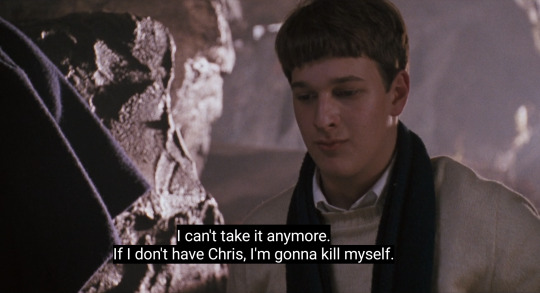
I believe that this line could be a form of foreshadowing. Yes, it is Knox being a dramatic and insufferable prick but it also feels like it could be more. Obviously it isn't Knox who dies in the end, but the idea of not being able to have something leading to suicide feels very important to the story.
Neil is unable to achieve a career in acting because of his father. As well as this, he is being taken away from his family. His real family. By not being able to have this thing that he so desperately wants, he feels like there is no other solution than death.
Knox says that if he can't have Chris he will kill himself, Neil has practically everything he loves stripped away from him- he cannot have it. So... He kills himself. There is a lot of foreshadowing in this film that hints to Neil's death at the end of the film and I do truly believe that this is a part of that foreshadowing.
My next point is that it is used as a form of contrast.
We see that Knox is extremely open about his attraction to Chris... In a multitude of ways, repeatedly throughout the film. Whether his actions that show his attraction are good or not is a different matter (Knox... God how I hate you.)
Arguably this is used as a juxtaposition. Knox (and Chris?) are relatively open about their attraction to one another- while Neil and Todd are very closed off about it. It is never explicitly stated that Neil and Todd like each other in that way, but through subtext it is heavily implied.
Why might this be? Well, considering the film is set in 1959, it could be because homosexuality simply wasn't legal at this point in time. Neil and Todd weren't allowed to be open about liking each other. Being open about it could put them in danger, they had no choice but to stay quiet.
However, as well as a contrast, it poses similarities between Knox and Chris and Neil and Todd. By setting up this contrast, it only brings to the surface some quite significant similarities.
Because let's be real.
How can THIS be a look of true love...
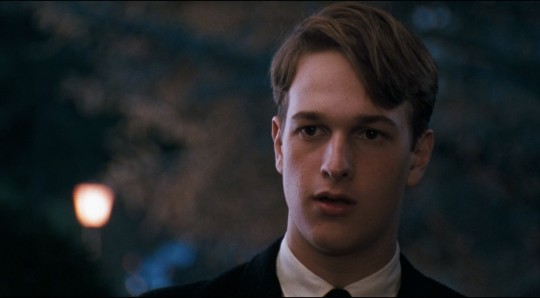
And THIS not be?
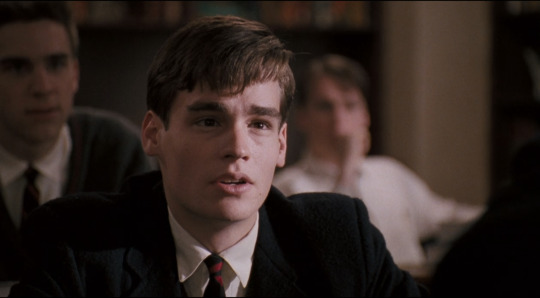
Or falling in love or admiring one's beauty or WHATEVER you want to call it. That's not the point. The point is, they're not that different.
You can see similarities between Knox's behaviour towards Chris and Todd's behaviour towards Neil (and vice versa). One of the main similarities is, well, how they look at one another. I personally don't see how the way Knox and Chris look at each other is true love but the way Todd and Neil look at one another is just... Them being roommates.
The juxtaposition between the two sets of people (I didn't know how else to say this) just doesn't seem accidental. The constant mention of Knox's feelings and love towards Chris just makes the way Neil and Todd interact more obviously... Romantic? Loving?
Their love is stated to allow the audience to see how similar they are to Todd and Neil, while still sticking to one of the key concepts of the film - conformity. Neil and Todd having to conform to societal standards, not being able to share their love for one another.
Knox's feelings for Chris are explicitly stated, repeatedly, because Todd's and Neil's can't. It makes it more noticeable. Neil and Todd's feelings can't really be stated due to the law. So they do it with Knox instead. The similarities can be seen throughout the film in how Knox treats Chris and how Neil and Todd treat one another.
Because again, how can Knox look at Chris like that and that show that he is in love, but Neil look at Todd like that and that just be... Them being friends?
The answer is, it can't. Not really.
Although Knox is a lot more explicit with his feelings towards Chris than the other two are with one another, the feelings they have are the same. Whether it is portrayed in the same way or not, it's love.
#dead poets society#dps#neil perry#todd anderson#knox overstreet#chris noel#anderperry#percy rambles#long post#its been a while since ive posted dps content... how we feeling fellas?#i go through phases of using tumblr regularly and then barely using it at all#hopefully i have some more dps posts for you guys soon#for now i hope you like this post#still a knox hater though 🫶#dead poets fandom#dps fandom#analysis post#sorry for yapping
109 notes
·
View notes
Text
Sanji during Water 7 and Enies Lobby :
"Who the hell are you?"
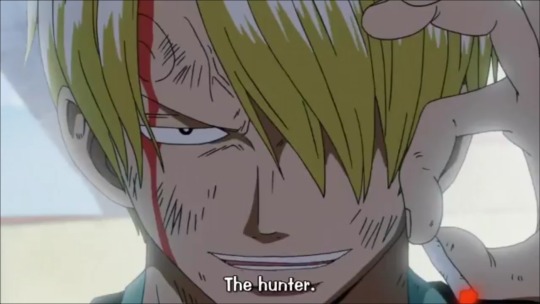
GET HIM, CUNTJI
I firmly stand by the point that the strawhats would fall apart and Robin would be taken if sanji (and zoro) were not present during water 7 and Enies lobby. These are some of the things i loved the most about sanji during Water7 and Enies Lobby arcs :
(1) Protecting the captain AND the crew : When Luffy and usopp were fighting over merry, at one point sanji instantly kicks Luffy to shut him up.
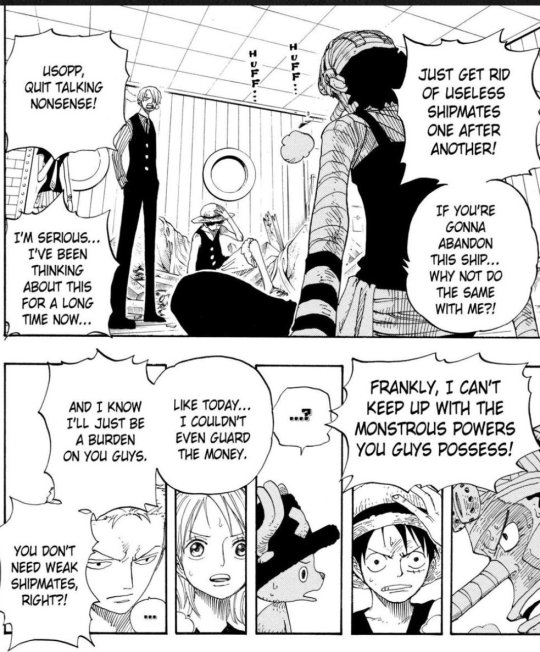
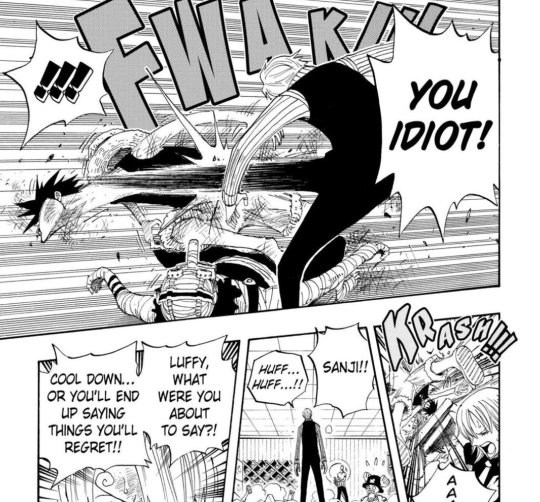
His empathy, protectiveness and foresight really shines here. He knew that Luffy wouldnt be able to forgive himself if he kicked Usopp out, but at the heat of the moment he was about to do just that. So he protected Luffy and became the voice of reason in Luffy's incredibly vulnerable moment.
At the same time, sanji showed empathy towards Usopp by standing up for him. During this fight, Usopp was physically and mentally weak, and seeing that at least one of his crewmates stopped the captain actually helped usopp feel like less alienated in the crew. This way Sanji became the (violent) rock for both Luffy and usopp in that moment.
(2) Trust : Some people make fun of this panel but all the Strawhats were deeply CONFUSED with Robin's participation in iceburg's assassination (which is normal cz she hadnt been with them for long and she was an enemy before joining the crew). But sanji could tell that she was lying and he trusted his crewmate (NOT BECAUSE SHE IS A WOMAN). Sanji never doubted Robin's intentions for even a moment and he was fully prepared to go save her (not question or clarify with her like the others wanted to) from the very first moment.
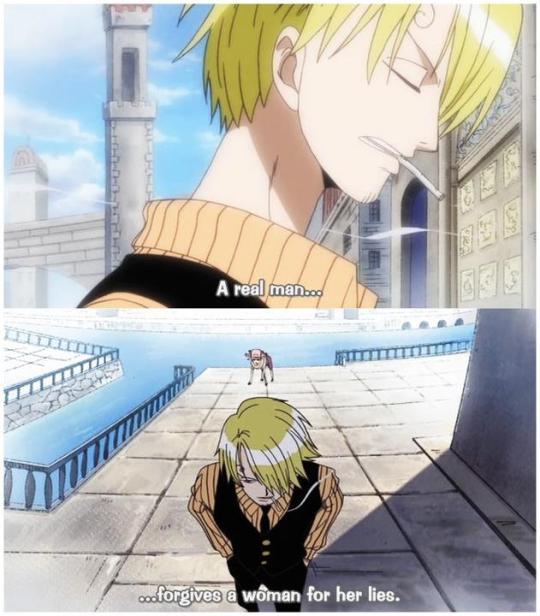
(3) Bravery :
Robin was scared out of her skull during this arc even though she was putting up a tough front at first. But sanji understood her desperation and the urgency of the situation. And like a dumbass, he got on the train ON HIS OWN after leaving a message to nami. Franky and usopp being there was his dumb luck but he would've been dead with the choice he made in water 7.
(4) Chivalry : It can't be a sanji admiration post without mentioning his endless chivalry. People may call him a pervert (which he is). But he actually respects women and he stood firm on his morals even in the face of death. This is a real Prince like man he didn't counter-attack kalifa even though she broke his teeth, turned him into a block of soap and pushed him from a high floor.
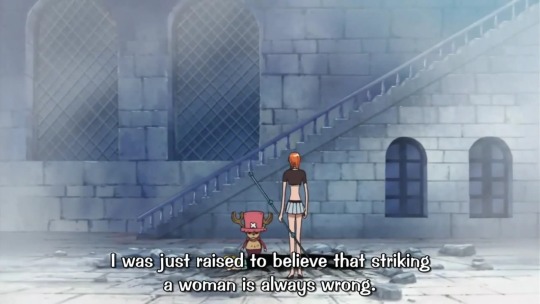
(4) in a crisis situation sanji showed Usopp that he believed in his capabilities, not with sympathy but with logic. Even in the face of danger he was sharp in the mind and empathetic towards his friend. This eventually led to Usopp actually succeeding to snipe the keys to robin and franky on the bridge of hesitation and that move is what saved Robin from being dragged to the gates of justice.
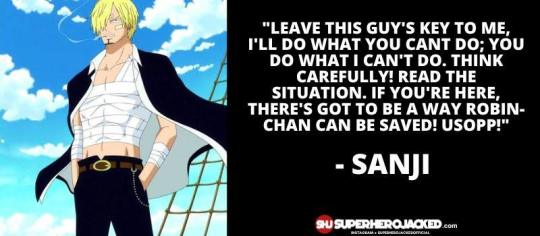
We can see how Sanji's words encouraged Usopp and propelled him into action.
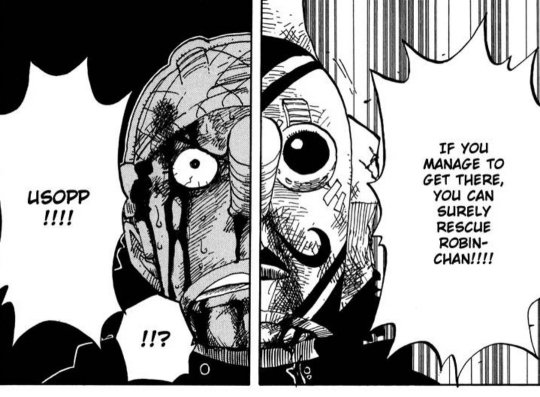
(5) Intelligence :
While on the train, sanji devised a plan to rescue Robin before reaching Enies Lobby.
At enies lobby when they were up against the the Government's elite assassinators, Sanji came up with the plan to collect the keys and save Robin.
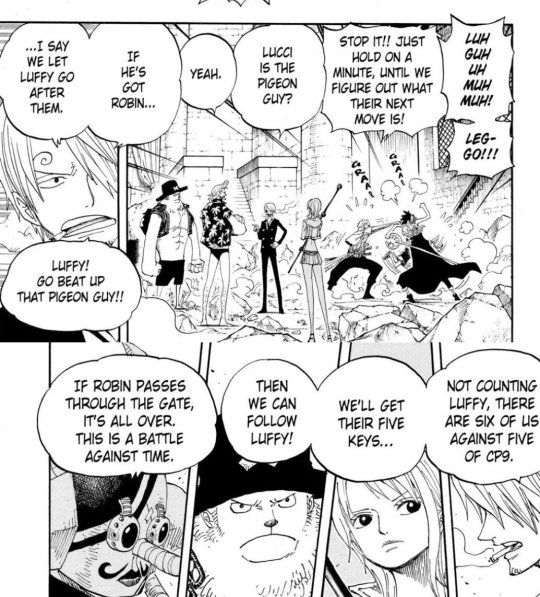
The strawhats would be deadmeats if sanji didnt sneak out mid fight to close the gates of justice. The whirlpool is what let the strawhats escape. So, Sanji's foresight and intelligence is what finally saved his crew from a national level buster call.
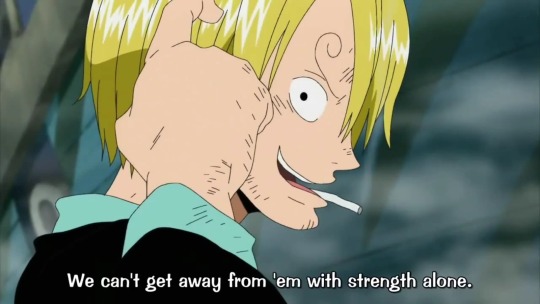
(6) Emotional Intelligence :
Sanji quietly kept tabs on Usopp from time to time the entire period he was out of the crew. Let's all acknowledge Usopp would've probably died in that Aqua Laguna if sanji (and chopper) didn't go warn him about it. And he was very considerate in the way he didn't do it directly to not hurt usopp's pride.
Moreover in the water 7 filler arc we can see how sanji was still keeping an eye on Usopp and that he was planning to return to the crew. He didn't cut off his friend just because the crew was going through a rough phase.
(Someone joked how Usopp probably had to be put on suicide watch during water 7 and i was like THAT'S EXACTLY WHAT SANJI HAD BEEN DOING THE ENTIRE TIME THANKS FOR NOTICING )
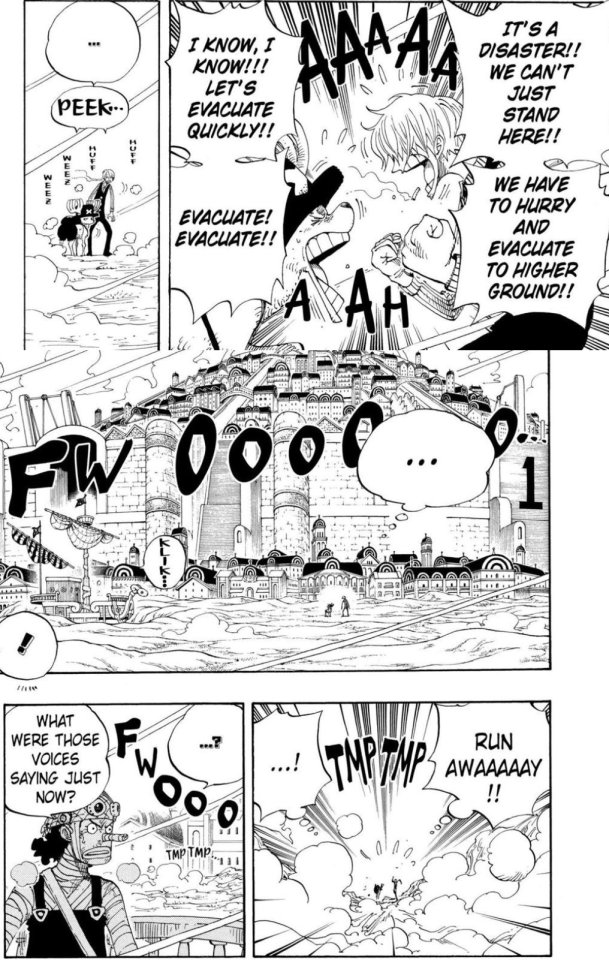
#i could talk about sanji all day#NURSE SHE IS SIMPING FOR SANJI AGAIN#i feel like doing this types of threads for all arcs lets seeeee#honestly these are just scratching the surface of how wonderful sanji is#he is so much more than just a perverted lady's man#if u cant see how wonderful he is im afraid its time for a visit to the optometrist's and probably also a lobotomy#sanji is amazing#nd so is zoro i gotta finish my Zoro essay soon#i also have so many screenshots of water 7 moments the limit is stopping me lmao god forbid a girl wanna admire her boytoy#vinsmoke sanji#black leg sanji#one piece sanji#sanji#kuroashi no sanji#water 7#one piece water 7#one piece#one piece season 8#one piece season 9#one piece analysis#op meta#one piece meta#sanji meta#meta
70 notes
·
View notes
Text
Teen wolf headcanon #8: Scott and Stiles have known each other since they were very small, but they got close when Stiles was grieving his mom. Not because Scott was understanding – but because he wasn’t. Scott is quite socially oblivious, canonically, and at that point Stiles desperately wanted that. Someone to act like everything was normal, even for just five minutes. Someone who wouldn’t notice his hands shaking or his eyes welling up, if he hid it fast enough. So he stuck around with Scott, and they got close. He also liked being at Scott’s house, partially just cause it was in the middle of nowhere, but also to get away from his own house – with his dad either gone or drinking, the house was way too quiet, and even his talking didn’t seem to fill the silence. (Side bar: Obviously, his dynamic with Scott changed over time! Although Scott remains socially oblivious, he tries to notice things with Stiles, occasionally even using his werewolf senses; and Stiles tries to remember to actually tell him things, although he’s not super into that.)
#their friendship is epic#but I feel like its a little unequal at times#i wish stiles would ask for help more in later seasons like he used to in the beginning#but he's a little overwhelmed#teen wolf#character meta#character analysis#stiles stilinski#bro OTP sciles#sciles#scott mccall#claudia stilinski
75 notes
·
View notes
Text
random assorted headcanons for Turbo because I like thinking and having fun !!!! 🎉

Read More to Find Out...or are you too scared?... i bet ur too scared ahaha youre too scared Lol! Hahaahaaa!!!
The steering wheel of his kart is covered in bite marks, similar to how one would bite their favorite pencil. he bites things to mark his territory because Nobody is gonna touch that unless they want all of his diseases (150+).
i just know he was fighting to restrain himself not to chew on any of the candy civilians
when it comes to music, he doesn't see the point of listening to it. he doesn't have enough patience to really take it in; to him, it's just a thing that exists and not much more than that ¯\_( ∵ )_/¯
adding onto that point, this guy listens to metal clanking sounds and loud engine roaring for entertainment because he likes things that would overstimulate any normal person. turbo is incredibly sensory-seeking and will do anything for The Sensations
someone should take him to a heavy rock concert i think it would change him a little. keep that thang on a leash
related to being sensory-seeking, i think he would absolutely love running his hands over random textures. if anyone has run their hands along a wall while walking alongside it...He does that...If u know u know... he is SO stimmy its unbelievable. Unreal.
very pain-tolerant. he'll whine and complain about it for attention, but physical hurt really doesnt bother him much until it gets in the way of what he wants to do.
funnily enough, he is very picky when it comes to temperature. he can handle getting ran over but if its 1° too hot or cold he'll start nagging and nagging for it to go back to normal. turbo really needs his own enclosure i think it'd do him a lot of good
this is a more popular headcanon and its canon-leaning, but he's an artist :-] he usually sticks to graffiti art because its generally considered more "rebellious and cool" but he also sketches cars, design decals, and other stuff when hes alone!
i would love to see his process of character designing king candy because i dont think he really knew what he was doing
he was just like "ok what does a generic king look like. uhhhhh.... 1, old and jolly like santa claus.... 2.... uhh crown..... 3......... purple.... FUCK YEAH im so good at this!!!!🔥🔥🔥"
i just noticed how his design has like 0 actual candy motifs aside from his bow being a candy wrapper and his shoes having those little gumdrop end pieces. what was he THINKING
while King Candy has a lisp, i think it's a coverup for his actual voice because of how goofy and recognizable it is. Overall its the same as his regular voice, he just gets silly with it. i noticed that he still does retain some of his lisp when hes screaming his lungs out at Vanellope, however, so maybe he genuinely does have a lisp that makes itself known when furious :3
another thing i noticed is how he hisses his S's. very cool very cool the reptilian
@/tasticturbo made a post abt how he has tinnitus from the constant noise in his game and i couldnt agree more
AND THE PRESCRIPTION GLASSES. where did he get those...he needs to See
side note, the aforementioned account has made so many interesting analyses on turbo and theyre all so insightful. i recommend u check them out
i think he gets migraines from stress. constant buzzing or pain flood his head but hes like "IDGAF i need to DO something at ALL TIMES no matter what"
hes like a shark in that way. if hes not moving he'll die instantly. idk a lot about sharks or if thats how it works srry but im going off of what the Worms are saying to me and i dont have much to work with
i think a really big contributer as to why he lacks in the self care department is because he fails to notice that something in his body is wrong. hes far too distracted on something he thinks is more important than remembering to Eat Food or Drink Water or Wash Himself or
he's like "WHY DO I FEEL LIKE SHIT ALL OF THE TIME!!! I HATE MY LIFE" and he hasn't slept in 4 days
hes so me. Sorry.
i dont think turbo is necessarily suicidal, but the way he behaves shows a clear disregard for his own safety and wellbeing. he thinks that he knows what he needs but he really doesnt :-[ i think he has some kind of immortality complex, feeling untouchable and like nothing could get to him. as scared as he was when ralph was about to turn him into sloppy mush, he didnt take the threat very seriously. like it was some kind of joke
his kart regenerates every time his game starts up, so what if he smashed it into buildings for fun. He's the number one fan of car accidents. he is all about that shit
i think his living space would literally be a garage btw. its a place to sleep and a space for his car all in one!! he thinks its very convenient and awesome but i think he is coping. he has some old dingy stained sheetless mattress that he has never washed in his life and its covered in dirt and smoke particles. no wonder he has such heavy eye bags Dude Please
the turbo twins have a garage used in a similar way, and while its still pretty shitty, they still at least TRY to maintain it. they just fight a lot over who has to care of it. nobody taught them how to take turns ever
but this aint about them. maybe another day
i think that turbo would find comfort in garbage and keeping it around because its familiar to him. a big clean empty space would make him so mad and if anyone moves even an inch of scrap off to the side he will throw a fit. he generally doesnt pay attention to his surroundings but when its his personal space he is 1093 times more neurotic
i think the big empty castle he stole wouldve been a big transition for him. maybe it helped him clear his mind a little more to practice his tricky schemes...it helped him get more subtle
thats all i have for nowww ty for reading ^_^ if anyone else has any wacky ideas pleeeease tell me i would love to hear them!!
#tw suicide mention#its very brief but still#turbo wir#turbo#king candy wir#king candy#headcanon#analysis#<- ??#wat ever#i like little details that dont impact the story at all whatsoever. it just makes the characters feel so much more lively#like i could have full conversations with this guy in my head (normal)#side note i really want to talk about the turbo twins bec i fuckin love them but then i remember they have no personality in the movie--#--so id be making analyses on other peoples interpretations of them HAHA. EVERYONE STOP BEING CREATIVE NOWWWE!!!!#love for ever#wreck it ralph
41 notes
·
View notes
Text
So um, in light of my last post I was inspired to look into other dsmp people's ages because I feel like we don’t really think about it too often and oh does it make things interesting…
Just for reference and consideration, here are some United States Legal Age Minimums:
Drive: 16-18
Adult: 18-21
Vote: 18
Drink Alcohol: 21
Political Office: 25 (Representative) 30 (Senator) 35 (President)
Military: 17-18
Also Note: On average the brain is scientifically not fully developed until age 25 - and oh wouldn't you know it 90% of the server fall under that, meaning no wonder we have a bunch of wars their prefrontal cortex isn't fully developed and wouldn't you know it that part of the brain is responsible for regulating attention, behavior, and emotion as well as the processing that Actions Have Consequences... huh whelp that makes sense.
Anyways… age data is below (I didn't do everyone nor every event - nobody got time for that ;D... I didn't have time for this to begin with lol...) But I specifically want to highlight that not only was Dream 21 from Jan-Aug of his Imprisonment, but Sam was also 21 till Jun, and Quackity was literally 20 while he was daily torturing Dream... 20?! They were roughly a year apart, all of them so close. Like can you imagine, treating your peer like that? Sam is like a couple months older than Dream and that's it. Quackity can't even drink legally in the United States. That's insane...
(* to signify canonical Immortality)
Ok, so the full list of members and ages is at the bottom, but first, here are so key events I picked just to highlight their ages at the time.
Server Creation - April 24, 2020
GeorgeNotFound - 23 Callahan - 23 Dream - 20 Sapnap - 19
L'Manberg War - August 2, 2020
BadBoyHalo - 25 WilburSoot - 23 GeorgeNotFound - 23 Callahan - 23 Punz - 23 Eret - 21 Awesamdude - 21 Dream - 20 Fundy - 20 Skeppy - 20 Ponk - 20 Quackity - 19 Sapnap - 19 Niki Nihachu - 19 Jack Manifold - 17 Purpled - 16 Tubbo - 16 Tommy - 16
Pogtopia vs Manberg War - November 16th, 2020
Philza - 32* BadBoyHalo - 25 HBomb - 26 WilburSoot - 24 GeorgeNotFound - 24 Callahan - 23 Punz - 23 Karl Jacobs -22 Antfrost - 22 CaptainPuffy - 22 Eret - 21 Technoblade - 21* Awesamdude - 21 Dream - 21 Connor - 21 Schlatt - 21 Fundy - 21 Skeppy - 20 Ponk - 20 Quackity - 19 Sapnap - 19 Niki Nihachu - 19 Jack Manifold - 18 Purpled - 17 Ranboo - 17 Tubbo - 16 Tommy - 16
Exile - December 4, 2020
Ghostbur - 24 Technoblade - 21* Dream - 21 Ranboo - 17 Tubbo - 16 Tommy - 16
Doomsday - January 6, 2021
Philza - 32* HBomb - 27 Callahan - 23 Punz - 23 CaptainPuffy - 22 Eret - 21 Technoblade - 21* Dream - 21 Fundy - 21 Ponk - 20 Quackity - 20 Sapnap - 19 Niki Nihachu - 19 Jack Manifold - 18 Ranboo - 17 Tubbo - 17 Tommy - 16
Disc Confrontation - January 20, 2021
HBomb - 27 BadBoyHalo - 25 Callahan - 24 Punz - 23 Antfrost - 22 CaptainPuffy - 22 Eret - 22 Awesamdude - 21 Dream - 21 Ponk - 20 Quackity - 20 Sapnap - 19 Niki Nihachu - 19 Jack Manifold - 18 Ranboo - 17 Tubbo - 17 Tommy - 16
Quackity’s First Prison Visit - March 16, 2021
Awesamdude - 21 Dream - 21 Quackity - 20
Techno's Visit- June 6, 2021
Technoblade - 22* Awesamdude - 21 Dream - 21
Jailbreak - November 28, 2021
Philza - 33* HBomb - 27 BadBoyHalo - 26 George - 25 Callahan - 24 Punz - 24 Karl Jacobs - 23 Antfrost - 23 CaptainPuffy - 23 Foolish Gamers - 22 Eret - 22 Technoblade - 22* Awesamdude - 22 Dream - 22 Connor - 22 Fundy - 22 Skeppy - 21 Hannahxxrose - 21 Ponk - 21 Quackity - 20 Sapnap - 20 Niki Nihachu - 20 Jack Manifold - 19 Purpled - 18 Ranboo - 18 Tubbo - 17 Tommy - 17
Comprehensive List From Oldest to Youngest: Name - Date of Birth (Current Age) - [Join Date] Age when Joined
Philza- March 1, 1988 (36) – [Nov 16, 2020] 32 *Immortal*
HBomb- Jan 4, 1994 (30) – [Sept 22, 2020] 26
BadBoyHalo- April 2, 1995 (28) – [May 19, 2020] 25
Wilbur- Sept 14, 1996 (27) – [July 12, 2020] 23
GeorgeNotFound- Nov 1, 1996 (27) – [April 24, 2020] 23
Callahan- Jan 19, 1997 (27) – [April 24, 2020] 23
Punz- Jan 31, 1997 (27) – [July 7, 2020] 23
Karl Jacobs- July 19, 1998 (25) – [Aug 26, 2020] 22
Antfrost- Aug 27, 1998 (25) – [Sep 5, 2020] 22
Captain Puffy- Sept 18, 1998 (25) – [Nov 16, 2020] 22
Foolish Gamers- Dec 18, 1998 (25) – [Jan 16, 2021] 22 *Immortal*
Eret- Jan 9, 1999 (25) – [July 19, 2020] 21
Technoblade- June 1, 1999 (23) – [Sept 22, 2020] 21 *Immortal*
Awesamdude - June 8, 1999 (24) – [April 28, 2020] 20
Dream - Aug 12, 1999 (24) – [April 24, 2020] 20
Connor- Aug 26, 1999 (24) – [Nov 16, 2020] 21
Schlatt- Sept 10, 1999 (24) – [Sept 20, 2020] 21
Fundy- Oct 10, 1999 (24) – [July 7, 2020] 20
Skeppy- Jan 17, 2000 (24) – [July 18, 2020] 20
Ponk- April 18, 2000 (23) – [May 7, 2020] 20
Quackity- Dec 28, 2000 (23) – [Aug 11, 2020] 19
Sapnap- March 1, 2001 (23) – [April 24, 2020] 19
Niki Nihachu- Nov 3, 2001 (22) – [Aug 6, 2020] 18
Jack Manifold- Aug 14, 2002 (21) – [Aug 3, 2020] 17
Purpled- Oct 24, 2003 (20) – [July 9, 2020] 16
Ranboo- Nov 2, 2003 (20) – [Nov 17, 2020] 17
Tubbo- Dec 23, 2003 (20) – [July 7, 2020] 16
Tommy- April 9, 2004 (19) – [July 4, 2020] 16
They are all babies confirmed... things make so much more sense... brain development guys it's important ;)
#dsmp#dreblr#dsmpblr#c!dream#dsmp analysis#this is fine#dream smp#dsmp lore#dishing up lore#pandora’s vault#c!sam#c!tommy#c!quackity#c!sapnap#c!tubbo#c!ranboo#dsmp finale#c!techno#c!punz#c!schlatt#c!puffy#c!foolish#c!purpled#c!george#c!philza#I can't believe it Quackity be torturing a guy basically his age that's taller than him and Sam... omg I just... damn... it hurts...#yo if your 20 and 21 you should consider a career torturing someone... lots of fun...#so many people are older than Schlatt including Sam and Dream… wild…#when you realize that not only can the kids not hold ferderal gov office but the majority can't... lol. not even philza can run for pres#its late at night so there are likely errors... feel free to let me know or add on? or maybe I'll do a more thorough detail...
93 notes
·
View notes
Text
one thing that I find really really interesting is that in practically every scene where it's just jiraiya and tsunade alone, kishimoto very deliberately draws at least a panel of the two of them being completely silent in each other's companies, even refusing to look at each other.
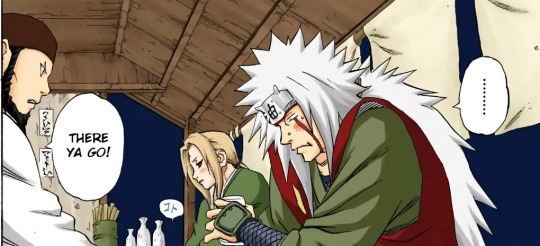
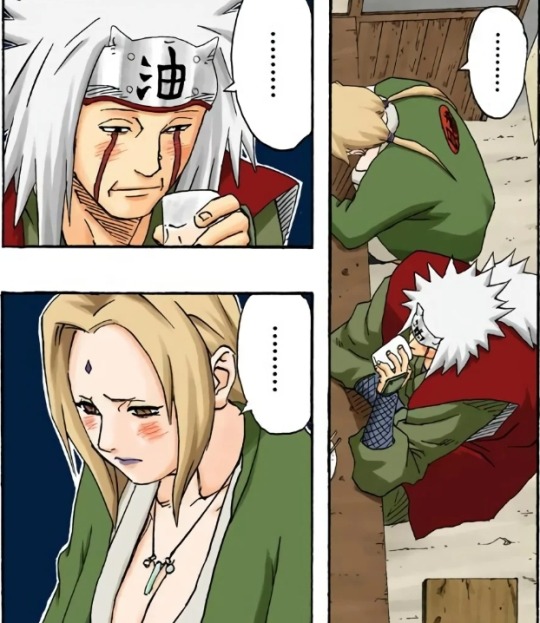
when jiraiya got drinks with tsunade in og
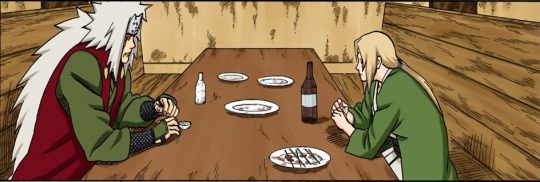
when he got drinks with her before he left. notice that neither of them are making any eye contact, refusing to look at each other.
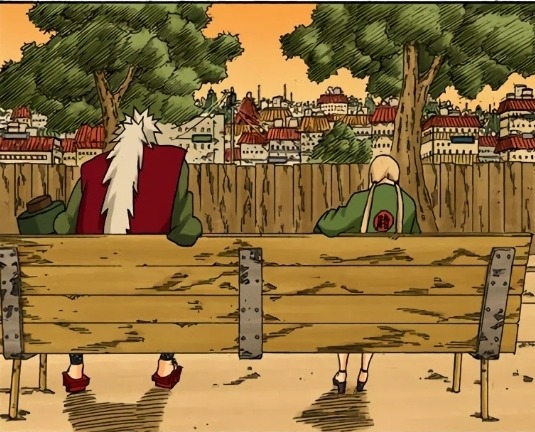
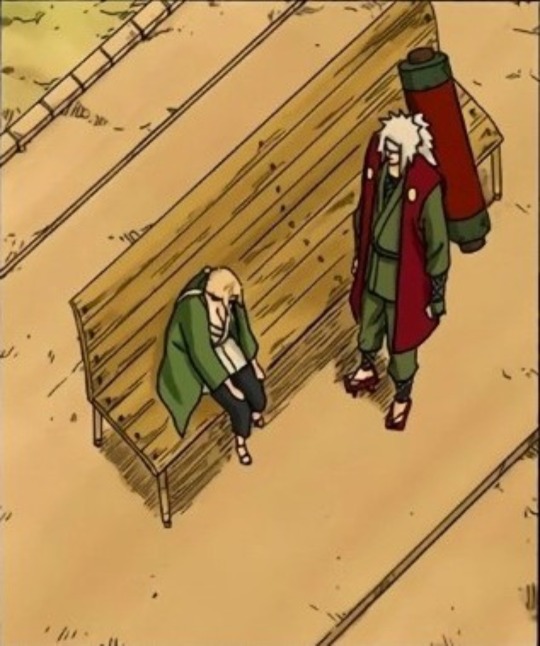
the iconic bench scene ofc
why this is important to me is cause I think it's an excellent way on kishi's part to show the dynamic and history between the two of them (and the sannin as a whole too). ((note this isn't a jiratsu post))
the few scenes we get of the two of them talking alone, you always get the impression that there's a secondary, entirely silent conversation going on in the background that only the two of them even know about. a conversation about all the things they cannot say. and he conveys that so well in these deliberate panels. you can SEE in their expressions, in the things that they do say when they choose to break the silence. there's so much between them, so much they yearn to say. and the weight of all of that, the depth of those feelings and emotions, is ultimately what makes them not say anything at all.
because you've known each other since you were SIX years old, you fought WARS together, this is a person you'd put your life on the line for without a second of hesitation. yet. there is a 20 year gap. you haven't spoken with each other for as long as you grew up together too. they've lived an entire lifetime together, but then an entire equally as long lifetime apart. they're the same person they've always been but yet... you can't really recognise the person in front of you. they both can see that they've become shells of the people they used to be. you both have gone through so much, and you know the the other person knows this. you know it so intimately, what things you can say, what things you can't. youre being so careful yet you both know there's this pretense going on.
there's so much left, yet so little. after all of that, what is there even left to be said? what CAN be said? they're already so intimately aware of what the other is thinking, there's nothing new, yet somehow, there's this gap. there's this emptiness that both know they can't really do anything about.
in the end, the sannin are a tragic trio. and kishi does an excellent job of showing this through their stories and histories, sure. but he does an even better job at showing it through their small interactions together. the way they always end up talking about the past, the attempt to bring up happier times (like tsunade trying to reminisce about their genin days as team hiruzen), yet how they ALWAYS come back to ultimately how they fell apart, and the world kept spinning, and all they can do is try to make sure the future doesn't make the same mistakes they did.
what can you even say to someone like that? it must've been so freeing, to have someone that understands them to such an extent. that would know them more than anyone else in the world ever could imagine. and yet. so suffocating. because they're a reminder. a reminder of what you used to be, a reminder of what could've been, a reminder of how everything went wrong, every single mistake you ever made. and so despite the person in front of you being the only person in the world that likely knows exactly how you're feeling, what you're going through, all your experiences, they're also somehow the last person you can ever speak to about any of it. because it becomes like a trap almost. they're constantly reminded of their pasts when they look at each other. how can you ever begin to move on with someone like that right in front of you?
once upon a time, they were the hope of konoha. they were the young shinobi, meant to bring in a new era of peace, meant to be the change. and they wholeheartedly believed this too. and then, to make it to 50, after everything they went through, and realising they were no better off than the generation before them. that everything they ever stood for, ever fought for, were all practically in vain. and how suddenly the people meant to be the change for the future can only hope to make sure there is still even a chance for change for the next generation.
really, what else are they meant to do around each other than continue their little dance or chess game and let the unspoken remain unspoken?
#like i said i have a lot of feelings and thoughts about the sannin#i cannot get enough of their dynamic#it doesnt help that kishi barely explores them at all#i want to see more of them#i wanna see how three carefree children grow up together and become as fractured as they did#theyre so different from team 7 too#cause team 7 doesnt have that much history that much shared experiences#team 7 are what the sannin couldve been if the sannin didnt give up sure#but there is definitely a reason that made the sannin give up in the first place#we need a prequel#sannin#jiraiya#tsunade#meta#hc#nart#naruto#naruto shippuden#the sannin#the legendary sannin#densetsu no sannin#tsunade senju#sorry im a rambler at heart#a yapper#i cant help myself#what is left????#this is what people mean when they say the silence is so loud its deafening#analysis#stream of consciousness#NOT A SHIP POST
64 notes
·
View notes
Text
love it when a character that's hard to read intuitively for you has like a dedicated fandom interpreter who can just glance at their blank face in a panel and then give you a 3k word essay on their innermost thoughts & desires & fears and neatly tie it back into the themes & whatnot as if it's the most obvious thing in the world
#im talking about griffith btw#guts i feel i get intuitively - maybe because i have some personality traits in common with him#and we get more about his life concretely told to us in canon. so he is a bit easier to pin down as a character and feel attached to for me#but whenever i was reading the manga i just kept wanting more insight about griffith's actions and feelings#like ok yeah its fun to have mysterious antagonists and suspense /tension etc but its also fun to feel like you deeply understand them too#and i felt like that was a bit missing from him for me in canon#so reading about him in analysis and fics is the most fun for me rn#he always felt kinda half unreal to me- which maybe was the point of him - but i wanted a bit more about his childhood or something?#and wished we had more stuff explicitly from his pov in the story to read or explanation about his transformation or wtv#and now he's so much more closed off to me even than he was in the golden age. i keep waiting for him to explain stuff and he does not#ANYWAYS all this rambling to say some people out there are very good at interpreting him and making his like. insecurities#more obvious to me bc i didnt really get that side of him from canon intuitively well#also im really enjoying reading the first few berserk fics ive read#there may not be a ton of them out there but there is def writing talent in the fandom#i'll share some recs once i'm done sifting through most of what's out there to read#also (not to tie everything back to death note but it IS my home fandom after all)#i feel griffith is obvs the more light-like character here and L maybe a bit guts-like? but unlike berserk in death note#light is the one you get to know best and L is the mysterious / unreal one you don't get a lot of concrete insight into#and in the DN fandom I can read the more mysterious character intuitively but had to warm up to the less mysterious one instead#and the mystery of L makes sense to me and doesnt bug me as much due to like - he HAS to hide a lot about himself or else he will die lol#so some similarities there but also some opposite feels as well#berserk spoilers#p
117 notes
·
View notes
Text
Spoilers for shadow of the erdtree, but...
I NEED to talk about Marika, okay?
In the base game, I thought she was interesting, don't get me wrong, but the amount of DEPTH SOTE gives her is INCREDIBLE.
The first time I got to the Shaman Village, I instantly knew she was going up on my Good Antagonist List™ immediately.
And, because of that, I wanted to have another ramble about her, as is becoming customary for this blog.
So, let's go over what exactly we learned about Marika and what this informs us about her character.
I think the Shaman Village really takes center stage here. The music, the item descriptions, it all combines to paint a gentler, more human image of Marika. In the base game, she was more like a god (which made sense seeing as she was one), but we see a more human side of her here.
So, the Shaman Village. It's the place where Marika grew up, her home. Unfortunately for her, shaman bodies are apparently quite good for putting into big jars, which was something the Hornsent loved to do. We've all seen it before, right? I mean, we've all seen a zealous religious society commit atrocities against an underclass in fiction, not the jar thing.
And the Hornsent are a zealous religious society. They used the bodies of shamen in jars to make saints. Which sounds like complete nonsense, I know, but that's just elden ring lore babey.
Anyway, it's my personal headcannon, if not outright fact, that the Hornsent's persecution of Marika's people is what led her down the path of becoming a god. Like Miquella, she wanted to make the world a gentler place. Unlike Miquella, though, she only wanted to make it gentler for her people.
In short, it's my belief that Marika became a god in large part to inact revenge on the hornsent.
Okay, pause. I know Elden Ring Lore is like, a big deal and all, and anything I say is basically unfounded on everything except intuition, my own personal interpretations, and because I believe my theories fit thematically within the wider narrative, but just stay with me on this, alright? I think there's a real undertone of misogyny in the fanbase, and sometimes that can color interpretations of certain characters even unintentionally. Marika has gotten this treatment worse than most, I think, because she is a prominent woman who does morally questionable things. Beyond the inherent misogyny, though, I've noticed that a lot of people interpret Marika's actions very uncharitably. Anyways, all that to say, this is my post, and I care more about everything working together thematically than digging deep into the depths of the lore to find out that "oh, actually Scrupulous the Untested mentioned this flower, which represents pure evil, and he was talking about Marika when he did," or whatever. A strawman? Perhaps, but you get my point. Still, I'll try to remain true to my understanding of the lore, but I'm bound to make mistakes. I'm not an expert. Sorry for the long aside, I just felt these were important points that wouldn't fit in elsewhere.
So, I believe Marika sought godhood partly to punish the Hornsent, although I won't pretend to understand her full motivations.
I believe this is what Ymir was referring to when he said "I fear that you have borne witness to the whole of it. The conceits - the hypocrisy - of the world built upon the Erdtree. The follies of man. Their bitter suffering. Is there no hope for redemption? The answer, sadly, is clear. There never was any hope. They were each of them defective. Unhinged, from the start. Marika herself. And the fingers that guided her. And this is what troubles me. No matter our efforts, if the roots are rotten, then we have little recourse."
My interpretation of this is that Marika's intentions for godhood were impure. She wasn't seeking to improve things, just punish the ones who wronged her people. Thus, her reign was doomed from the start.
Now, let's get into what really sold me on Marika as a character.
There are, to my knowledge, two items you can find in the Shaman Village.
The Minor Erdtree incantation, and the Golden Braid talisman. Let's take a look at the flavortext for these two items and see what we can glean, starting with the Minor Erdtree.
"Marika bathed the village of her home in gold, knowing full well that there was no one to heal."
So, by the time she returned to her village, everyone was already dead. How devastated must Marika have felt, to return from claiming godhood and revenge, only to find that there was no one left to avenge. She was alone.
Here's the text we get from the golden braid:
"A braid of golden hair, cut loose. Queen Marika's offering to the Grandmother. Boosts holy damage negation by the utmost. What was her prayer? Her wish, her confession? There is no one left to answer, and Marika never returned home again."
Man, reading that, with the shaman village music in the background, just thinking about a young Marika resolving herself to become a god, to save her village and people from the Hornsent, the anger she must have felt, the fear and solemn resignation of her goal, only to return again to find herself alone. What was her wish? What did she leave behind in her village? We'll never know, because Marika is alone. Her people are gone. In the end, she couldn't save them.
Is it really any wonder that she eventually began to doubt the very order she had founded?
But now let's talk about some other aspects of Marika's character that the dlc reveals.
Namely, her Omen sons.
Imagine how Marika must have felt, looking down at her newborns to see the very horns that had destroyed her people upon them. It's just so DAMN good, character wise. There must have been so many mixed feelings surrounding them. I wonder if she even felt any love for them at all when she saw those horns. Like, I don't know, obviously, but I imagine she felt conflicted. She didn't outright kill them, which is good, but she did leave them chained in a sewer for most of their lives, so yeah not great.
But that's what I love about her character. Elden ring, in a lot of ways, is about how victims can become victimizers. How, in pursuit of noble goals, or revenge, you can lose yourself and become just as bad or worse than the people you set out to punish. That's Marika's character. That's why she's part of the List™.
Because Marika started out as someone angry at the systems that oppressed her and sought to change them. She was the hero of the story, in the beginning. But, in pursuit of her goal, she lost herself and became a bit of a monster.
SOTE, to me, revealed that Elden Ring's story is one of complete moral grey. Everyone is working towards a cause that they believe in, including you. The ends justify the means for you, even if it means striking down a mostly innocent grieving woman, hunting your fellow tarnished, or turning on the ones who trusted you and called you a compatriot. Ranni, Miquella, Radahn, Fia, D, Godrick, Malenia, Leda, Ansbach, Thiollier, Gideon, this applies to everyone.
The same goes for Marika. In trying to punish the hornsent and build a better future for herself and her people, she lost her people and eventually succombed to her worst tendencies.
That's why St. Trina pleads with you to stop Miquella. Because to become a god is to sacrifice everything that makes you human.
Marika took that sacrife willingly, in order to punish the ones who hurt her, and in the end, that's what broke her.
I think she recognized this, and that's why she set the stage for you to become Lord. In the chance that someone might do better than her, make the world a gentler place, not for a god, not for ambition or power, not in revenge or anger, but im compassion. Whether or not that's how you choose to rule is, of course, up to you, but I like to imagine that Marika, after everything, found something to hope for again.
Okay, that's the end of my thoughts. Was any of that true to the lore? Who cares. It's how I like to interpret what we were given about Marika. If I'm wrong, then whatever. I'll still be right in my heart.
Alright, bye. Go play shadow of the erdtree, or watch someone else play it at the very least. Next time, I might talk about Miquella, or maybe Leda and her allies.
Someday I'll be brave enough to talk about Agent Black. Someday. But that would maybe turn into a full ten page essay about why Iconoclasts is so very good and I'm not sure the two people who care about what I say here are ready for that.
Okay bye.
A brief adendum to this post:
Because I was analyzing Marika from a literary perspective, focusing on the sympathetic angle SOTE added to her character, I realize I forgot something important, so let me say it now:
Marika's persecution does in no way justify her genocide of the hornsent.
That idea kind of got lost in the shuffle, but it's definitely an important aspect of her character. She's an antagonistic force in the world who has done some very awful things to further her goals, more so than any other antagonist in Elden Ring. Her tragic past only adds dimension to her character, not an excuse for the atrocities she comits.
Okay, bye again.
#elden ring dlc#elden ring#video game analysis#literary analysis#analysis#media analysis#thoughts#elden ring marika#marika the eternal#shadow of the erdtree#I could also talk about Morgott or Godrick if I feel like it#which is really how I decide which character to analyze#it's just based on what I feel like talking about at the moment#and I just beat the elden ring dlc so......#yeah expect some more scattered analysis on its characters
36 notes
·
View notes
Text
Clover's personality/mbti pt.2
PLEASE REBLOG IF YOU CAN (THIS AND MY PREVIOUS TWO BLOGS ABOUT CLOVER'S PERSONALITY), I WOULD LOVE MORE PEOPLE TO SEE MY UTY MBTI SERIES (TYSM)
When I said Clover has a more of a subjective than an objective train of thought, I also meant this: stealing money and stealing food is not OK in general but it is OK to them. They sure listen to themselves ↓
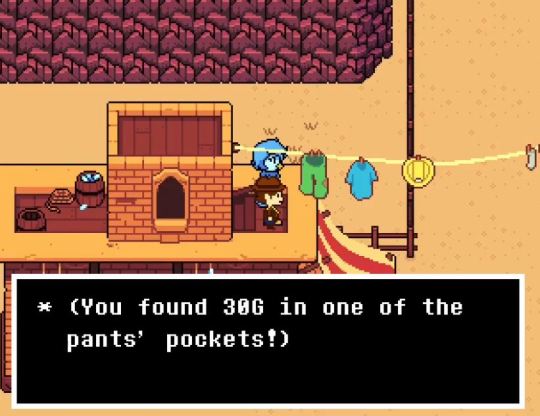
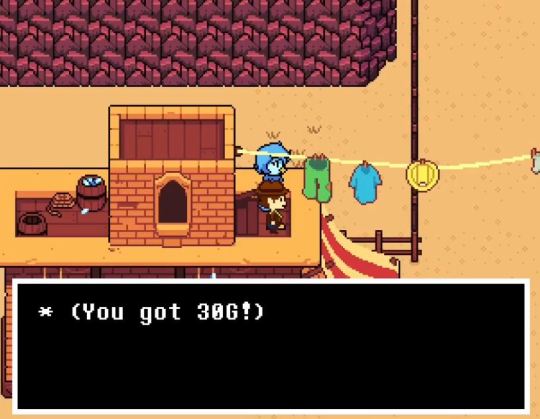
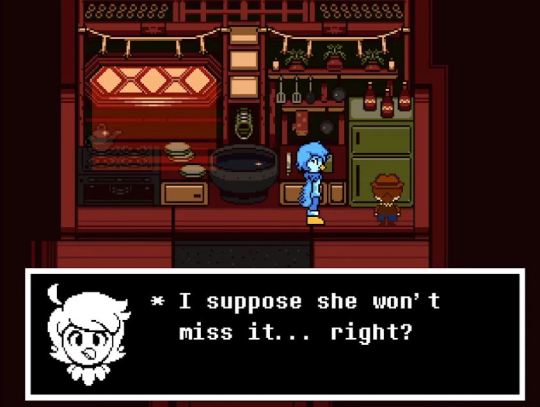
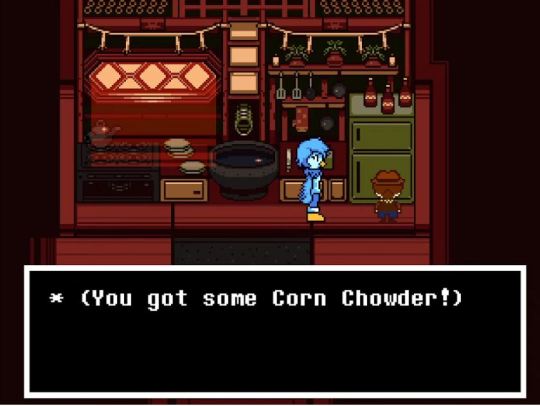
They have more of a creative than a mechanical mind (but in order to deal with a lot of the situations they were in, they had to use their head to survive), look at these ↓
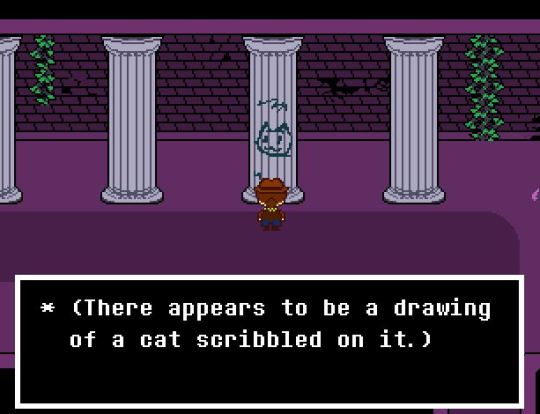
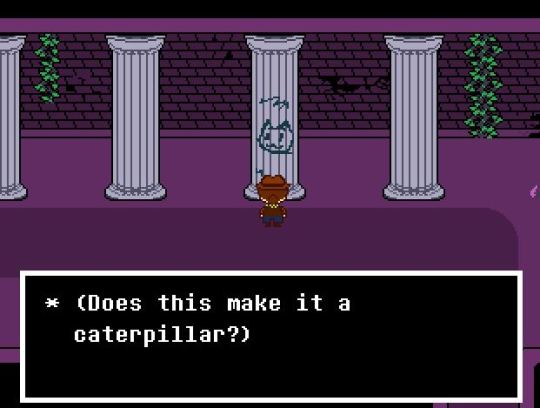
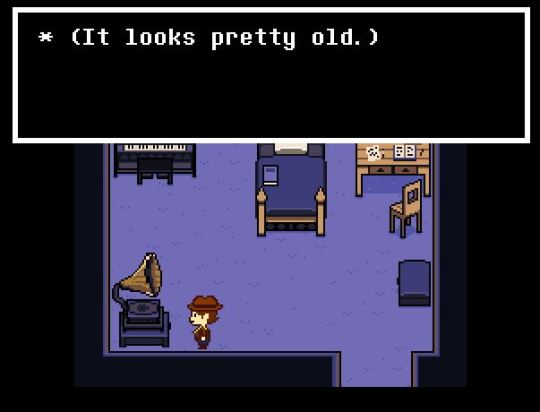
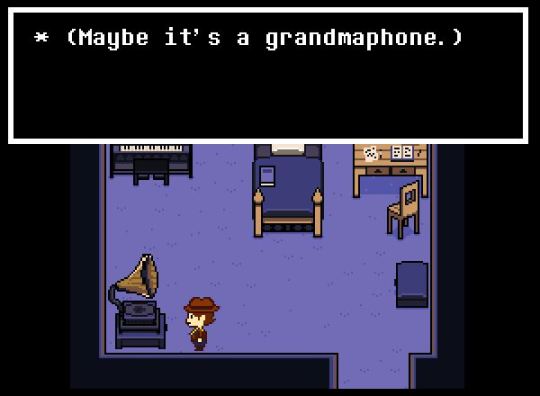
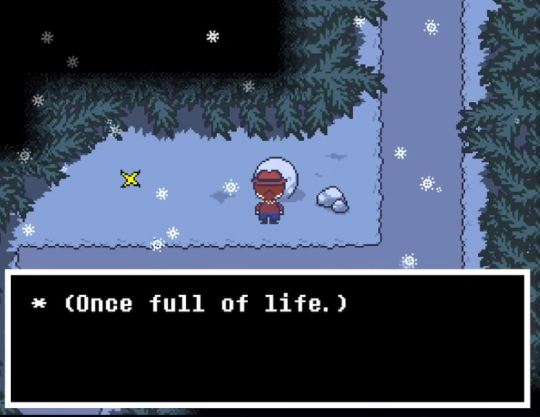
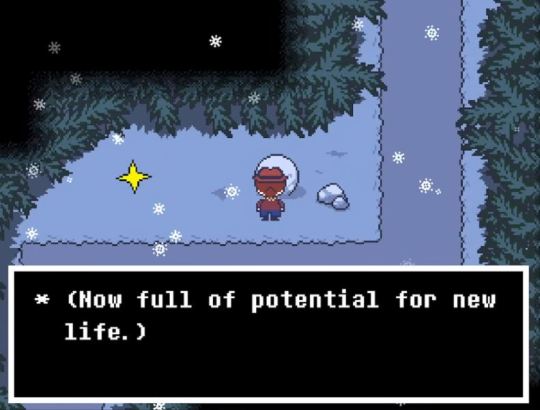
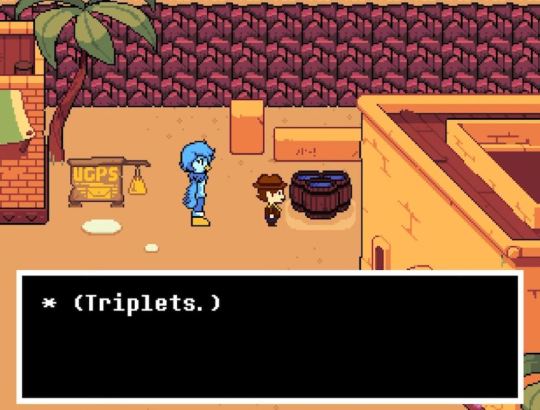
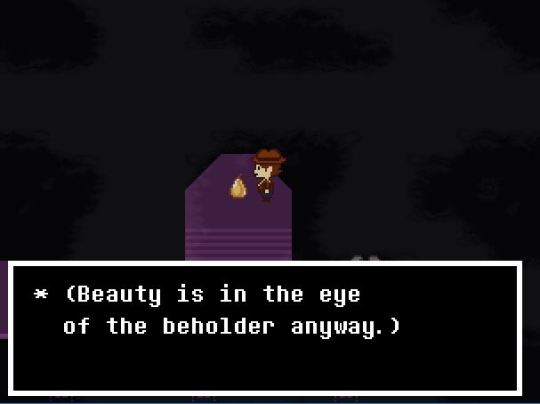
they literally linked this situation with a saying (this is so something an intuitive like myself would do)
Clover's thinking function was more prominent in the vengeance route; their thinking is activated to the maximum here instead of empathy, but it's still subjective since they still have that Fi paired up with Te (see my last post). The sad thing about genocide is how Clover loses absolutely everything that made them who they are in pacifist:
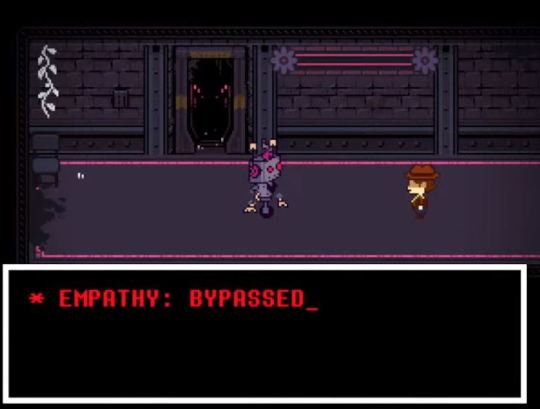
empathy gone
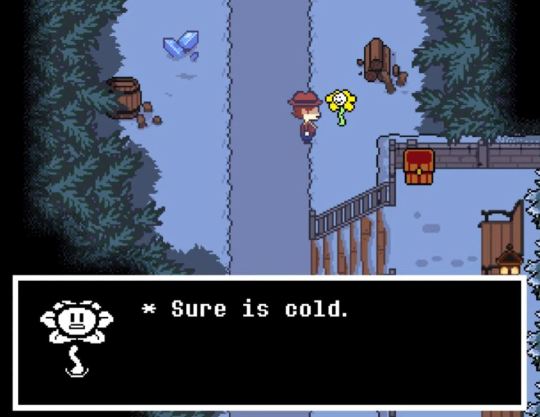
warmth gone (even Flowey feels their heart growing colder)
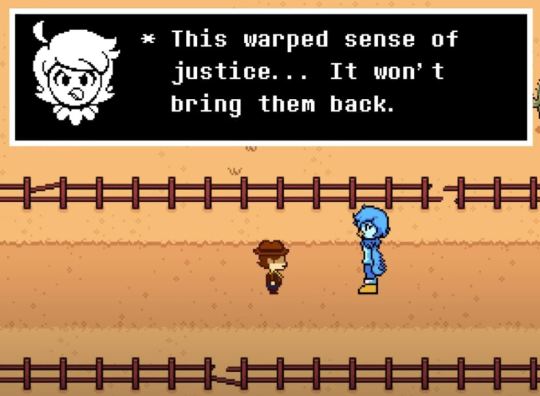
naivety gone
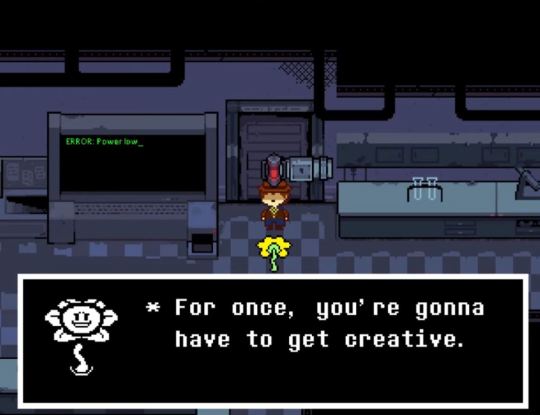
creativity gone
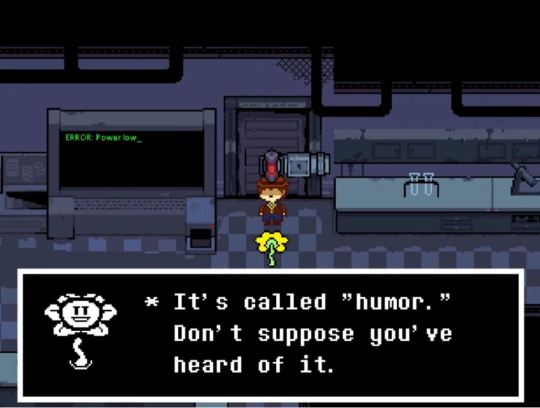
humor gone
Clover has always been kind, so I don't think their auxiliary is Fe. That isn't what needs to develop, or the weakest part about their way of thinking, the one that will shape them into who they were always meant to be.
Because they only felt kindness towards their own race, that's the problem. Clover was judgmental and thought they were doing the right thing, completely disregarding the monsters' side of the situation. Vengenace Clover is the other side of pacifist Clover's coin. This is what I mean ↓
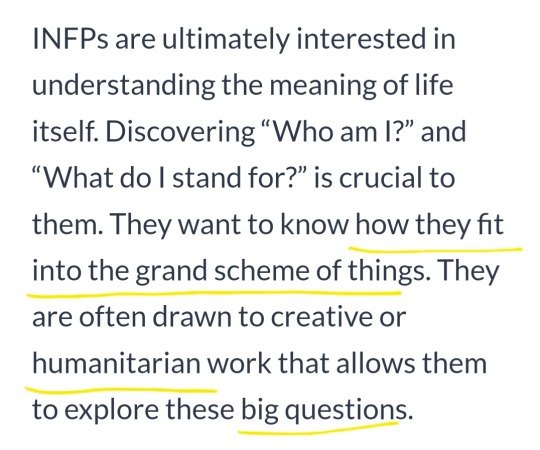
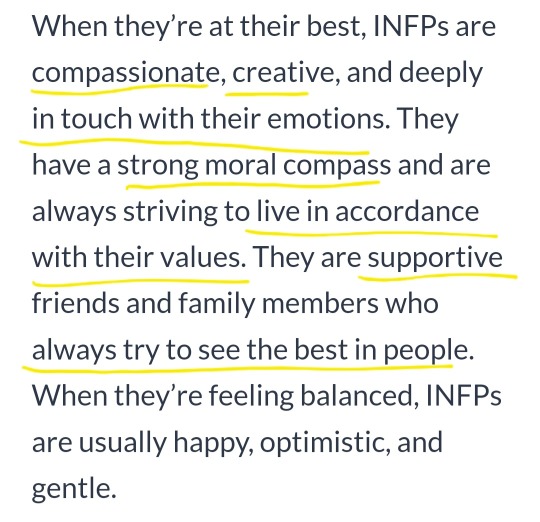
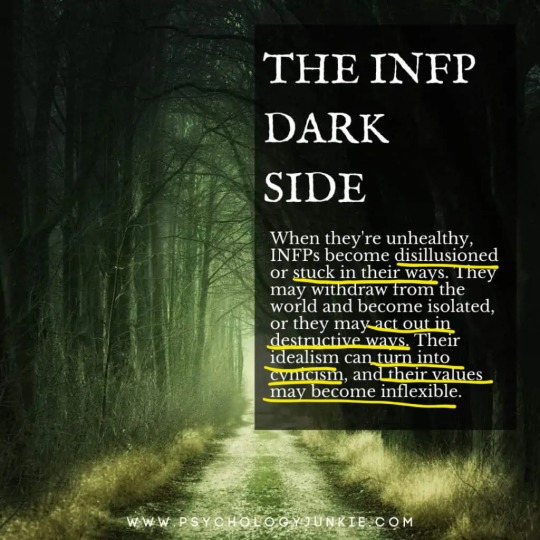
this type of capable of so much kindness but at the same time, if unhealthy, the effect is the complete opposite
That means the Clover in genocide IS the same Clover, but who made difference subjective choices. Whose justice for the children they didn't even know (they, once again, subjectively decided that the children had been innocent, as Martlet pointed out too) was so strong that they refused to see the truth: how both species struggled in this war.
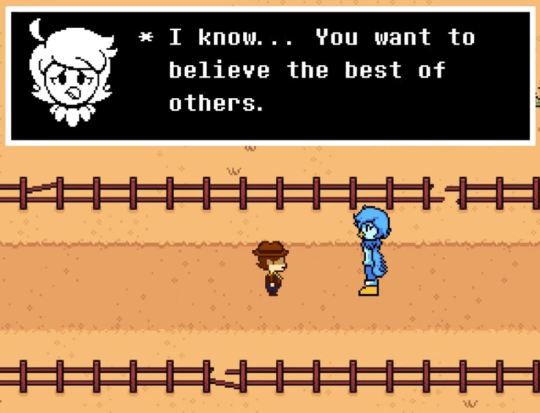
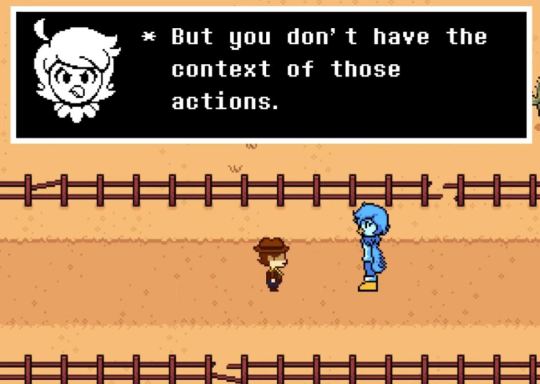
we can see Clover is still "idealistic" but tunnel visioned
"Normal" Clover is open minded, non judgemental and accepting of differences. They can put themselves in others shoes, but in genocide they're the opposite because they gave in to their "dark side" The reason I said they're the same Clover, is that, when I looked at the mbti people gave them, I saw this ↓
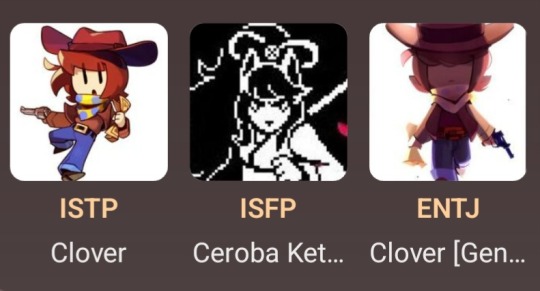
I knew right away it can't be right that the same character is a different type when they're at their best and worst. It had to mean that they're neither of the two types people thought
Clover had been introduced to a lot of different problems they had to constantly deal with and get out of the "comfort zone" that are the Ruins. Toriel undoubtedly told them about the kids, and then Clover decided to stay safe rather than jump into adventure. That's what got me thinking: "Their reason for being here has to do with morality: it is Clover who thinks how it's not right for no one to go look for the children." It's more their own values of what's right, than their own truth. They follow the heart more than the head (although the Te becomes developed as the adventure unfolds and they are faced with difficulties), even in geno (see the previous two posts for more about this point)
To learn to solve real world problems using logic, to step up and take charge, "defuse situations" and "mend relationships" by using both thinking and feeling, to become a leader and a hero, that's Clover's end goal.
Look at Clover from their first run (being protected all their life) and Clover from their 100th+ (faces challenges bravely and willingly dies a hero)
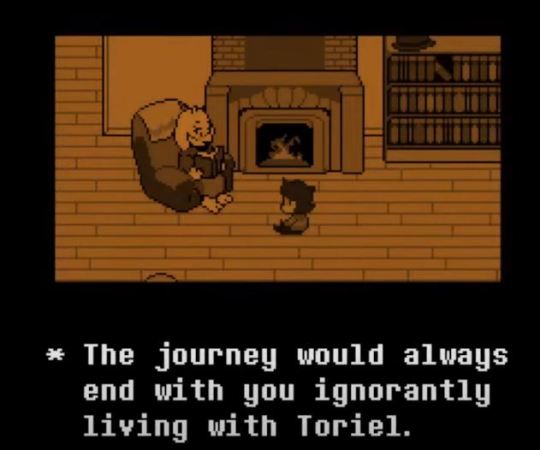
↓
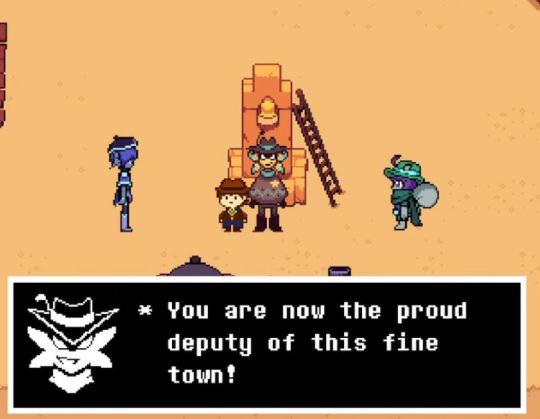
↓
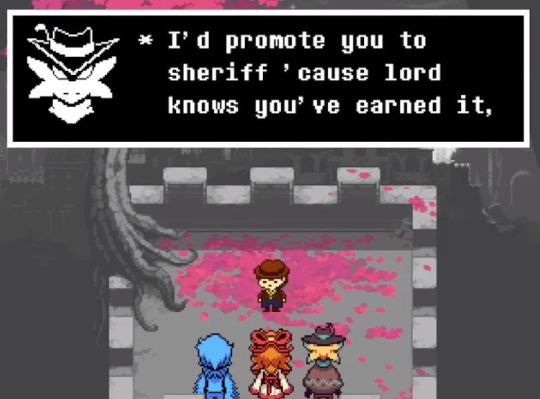
↓
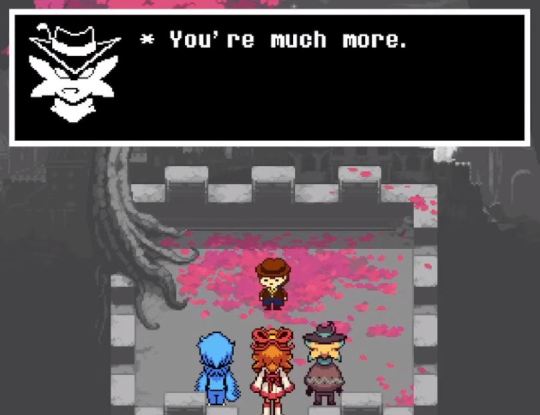
From a scared kid to a deputy to a sheriff to a hero.
#i love making these#still cant believe this has 3 parts already#i did my best to make it as accurate as possible#but im still a newbie with mbti#so dont take my word for it#and yeah the clover section is finished#feel free to suggest who i should do next#uty#undertale yellow#clover uty#uty clover#clover undertale yellow#undertale yellow clover#clover#character analysis#ive tried looking at this from different angles#but i still feel like its less about what happened to the kids (truth)#and more about clo wanting to bring them back home bc its the right thing to do#according to them (values)#doing nothing abt the situation wasn't an option to clover#it wasn't right
48 notes
·
View notes
Text
ON THE TOPIC OF BARNABY. as well as his relationship with Wally.
So. To kick this off - Riv (@funonion) and I were Speculating, and they introduced me to the johari window:

They put Barnaby in the “facade” section, and I entirely agree. To quote them;
“So he’s Wally’s guide, right? He’s the “knowledgeable” one of the two and is always the one teaching him new things. And you know, it’s one thing if you’re just teaching him how to laugh or how to tell a joke. But.
Clown has given us two doors. One says that Barnaby understands Wally in a way the rest of the neighborhood doesn’t, and is willing to do his dirty work so to speak. The other says that their friendship was not a natural occurring thing and had to be enforced repeatedly within the show. HOW THAT’S BEING ENFORCED IS ANOTHER THING ENTIRELY but it is worth it to note.
What is Barnaby willing to keep? What is he willing to bury for his little buddy? I can’t say anything definitively yet, but the fact that I even have to ask is telling. The class clown archetype is usually used as a way to cover up for something else a character might be experiencing”
And my response, (I won’t directly quote because I have little things in the phrasing & elaboration to add / tweak );
Barnaby being a Comic Relief Character immediately raised so many alarms in my head. I love comic relief characters. They’re always so fucked up in one way or another, and Barnaby is almost certainly SO inauthentic. He’s wearing a comedy mask just as opaque as Wally’s own mask. In everything we’ve seen about him so far he’s either Teaching Wally, wisecracking/joking, or… pretty much nothing else. We got that moment of concern in audio 14-14, but that doesn’t reveal anything beyond genuine care for Wally.
Comedic characters have the best disguises. Their poker faces & ability to deflect is always top tier [and practiced], and just look at comedy-focused actors and entertainers - so many of them have severe issues, either with their mental health or life. From what i’ve observed both in that aspect & with fictional characters, they play it off & work hard to entertain/deflect [one in the same] right up until the end. Sometimes it’s a coping mechanism. Usually it’s both. If they laugh loud enough and make people think they’re lighthearted fools w/ nothing underneath, no one will look any deeper and thus they’re “safe”.
& I’m a little suspicious that Barnaby’s red/orange/yellow spots aren’t naturally those colors. While yes, he could be (in-universe) designed that way to echo Ms. Beagle, there’s a strong possibility that that’s not it. What if he paints them to feel a connection to her, or it’s a physical manifestation of Barnaby covering up his insecurities/issues - what if it’s part of him striving to convince the world that he is what he paints himself as.
The laidback funnyguy with a loving mom and not a problem in the world.
And I mean, Barnaby claims to be a natural blue and I believe him! But the other colors? I’m doubtful
(I was going to include the Cast As Lil Kids Designs in this since Barnaby has all blue spots, but given how early in 2021 it was posted and how there seem to be little discrepancies from the ~official~ designs, I don’t want to provide it as evidence.)
& on the topic of Wally and Barnaby’s relationship being both real and not - disclaimer, this conversation happened before my Updated Thoughts On Them post, so there may be some minor rephrasing here from what I originally said - I’m sure that the relationship started out as inauthentic. Wally was assigned Barnaby as a best friend and technically vice versa, but I don’t doubt for a second that it became real to some extent. Clown wouldn’t treat their relationship outside of “canon” WH stuff the way that he does if they weren’t actually friends. They’ve said that Wally & Barnaby would be friends in every universe (which melts my heart <3 platonic soulmates my beloved <3), so then I have to agree with Riv. what WILL Barnaby do for Wally? I touched on this in the Milk Theory, but especially if Barnaby prides himself on “knowing Wally better than anything else”, what would Barn do to preserve that?
This relates to another conversation we had - Barnaby possibly having abandonment issues. It’s such a choice to have him of all characters be explicitly stated as an orphan. That and while every other Neighbor with a mentioned family have a somewhat large one (Howdy and his gajillion relatives, Julie and her three siblings, Poppy and her crowded tree [note: Eddie has a mentioned mother, but that info is tenuous and who knows if there are other Dears]), Barnaby has also explicitly stated that Ms. Beagle is his only family. That’s it. And farm life can’t be a sociable way to grow up, not with all the chores he must have had and how rural he might have grown up. Barnaby jokes that Home is the “Big Apple”, which could just be a joke - but jokes often come from a place of truth, and Home might be the most populated area Barnaby has lived in. Who’s to say!
Either way, Barnaby was orphaned one way or another, and I don’t doubt that it weighs on him. Especially if his birth parents really did abandon him. That added to a possible life of loneliness… I wonder if he’s latched onto Wally emotionally, which would hit all the painful places if it turns out that my “Barnaby is more attached to Wally than Wally is to Barnaby” theory has merit. Abandonment issues could also strongly back the apparent walls he’s plastered over with circus tent fabric
Back to Barnaby & Wally: the fact that, at present, Barnaby and Wally seem to have the best disguises / strongest masks. That. looking at 14-14, i suspect that Barnaby is excellent at keeping his up, but as soon as Wally’s mask cracks, so does Barnaby’s.
And then there’s the side of their dynamic that we could look at - it seems to be a very multifaceted relationship. The way that Barnaby genuinely cares yet in the 00 Halloween audio Wally was left off to the side and Barnaby was just “checking on him” while socializing (then again, this could be part of Barnaby understanding Wally & respecting his space / Wally wanting a break from that socialization). Barnaby is patient with Wally and yet he seems to sometimes treat Wally as his sidekick / let him fade into the background and yet Barnaby kept checking in on Wally during the 14 bug audios (this last one I could tie into the abandonment issues theory).
Then there’s how Barnaby calls Wally kid & can tend to treat him like one despite both of them being in the same age group. The way that all of this could, in a way, relate to the infantilization of autistic people (no matter how well-meaning or unintentional) & internalized ableism.
Note: Riv pointed out that Barnaby does seem to be doing the best with what he has, and that this can connect to the Johari Window’s blind spot / unknown.
I do agree with this wholeheartedly! And I have to mention that - and making a Very educated guess here - the interactions we’ve seen take place in the very late 60s / very early 70s, so Barnaby’s behavior towards Wally is actually pretty fucking stellar given the time period. We can’t expect him to be perfect or do everything / say everything right. That would be boring I think! And one thing I deeply appreciate about the Neighbors & their dynamics is that they feel like real layered people, not cardboard cutouts being perfect caricatures of what people are “supposed” to be like.
Riv also presented this:
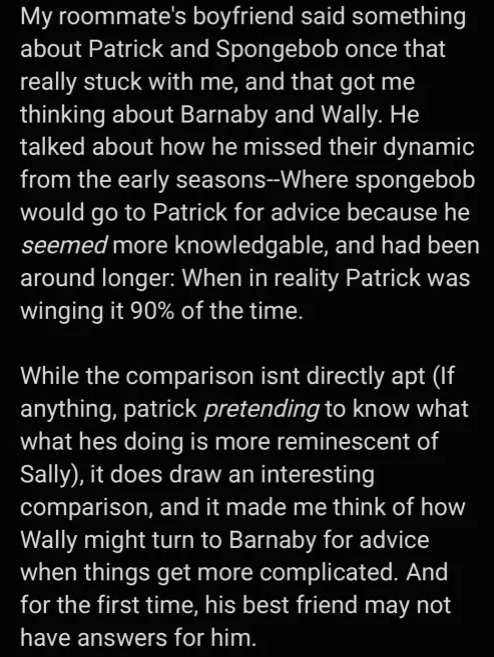
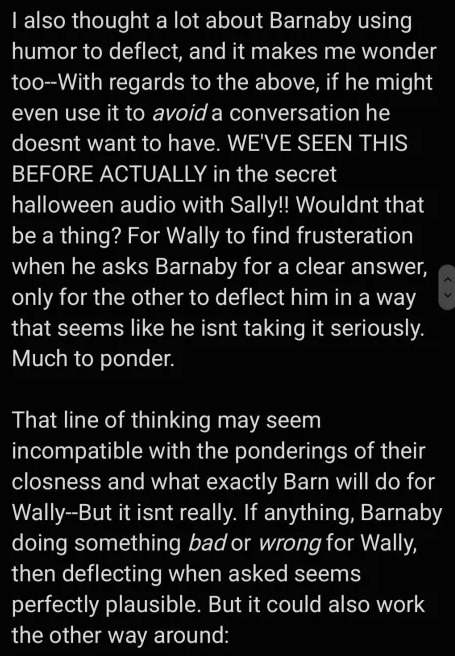

We likely are going to reach a point where Wally asks Barnaby something that he can’t / doesn’t want to / won’t answer. And like.. Ok. This is a slight tangent but I swear it’s related! When I first discovered WH and learned the Wally basics, I wondered two things.
Are we going to watch Wally “discover” new emotions? Because he certainly has them. Clown has said that Wally only ever feels happy, and a lot of people took that to mean that Wally can’t feel anything else. I don’t think we should take that answer at face value, because. I mean. Look at the project & creator we’re talking about. Layers, guys. Indirect direct answers. I think that Clown meant that Wally only ever feels happy in the Neighborhood because he has no reason to feel any negative emotion. Everything is as it should be. Until it isn’t - and I think that’s where he’s going to have to struggle with new emotions as he encounters them through new situations/events unfolding as the “story” starts to deteriorate. We’ve actually seen this a little bit - in Wally’s record audios (i believe the chronological second to last?), the way he says “Let Me In” so insistently. That’s definitely not a positive emotion being expressed.
How will the topic of death be handled - because it will be handled, it’s stated in the project warnings. I was wondering this even before I read the list, because I was presented with a blank slate puppet character and so went “oh fuck, this dude doesn’t know about death, does he?” Obviously I wanted to know how that would go. I want to know how it Will go!
How would Barnaby explain emotions that Wally doesn’t know how to convey? How would Barnaby explain death in a way that Wally would understand - given that Barnaby (& all the Neighbors sans Wally) knows what death is - and would Barnaby be willing to explain such a thing? I have a feeling we may find out.
And in a way, I suspect that if none of them know, Wally will find out himself and have to process it without help. But then again, how can something die if it was never really alive in the first place? Unless the death warning relates to human characters… I’m currently assuming it relates to both humans and puppets.
In conclusion: Barnaby has a carefully fabricated facade, he's doing the best with what he has but it likely won't be enough, and uh. shits fucked!
#AGH I HOPE IM PUTTING THESE POSTS TOGETHER CORRECTLY.#I HAVE TWO DAYS TO WRITE AND POST THEM ALL#but anyway another thing i was wondering in relation to barnaby & wally having an imbalanced relationship was#the possibility of:#howdy < barnaby < wally < home#as in the <[x] character is more important to the [y]< character than [y] is to [x]#because howdy does seem to like barnaby a whole hell of a lot but we don't know if barnaby feels so strongly back#idk. i feel like i might be seeing a little domino line being set up here. and im Nervous <3#what happens if the first domino falls? who will it be? how hard will it fall.#who's to say if that has any merit i just wanted to mention it! its intriguing to me#(& to be clear since im aware of my laughingstock rep - im not talkin about shippy dominoes)#(i take off the shipping goggles for analysis. howdy can fully cherish barn as a Friend while still being [y]<)#homebogging#welcome home speculation#wh speculation#i feel like i have more in my brain but. im dealing with minor flu symptoms and im exhausted <3#today was a Lot <3#so i'll queue this for around 10 & hopefully I'll be awake & with the next post written for you guys!
110 notes
·
View notes
Text
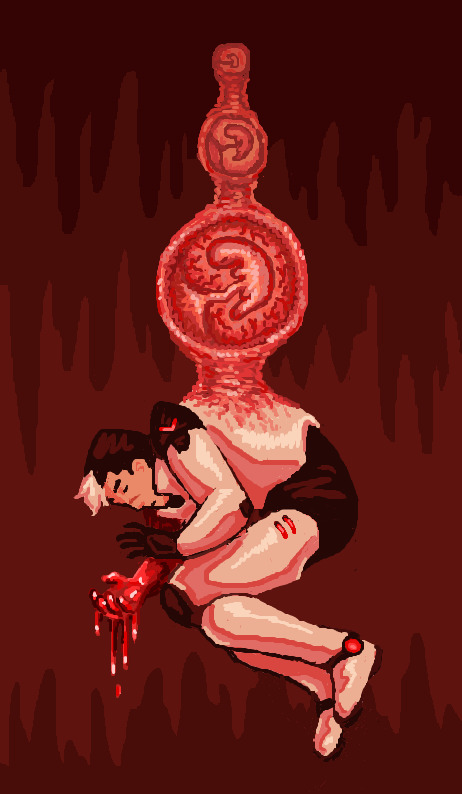
can you remember being born? were you born at all
#my art#kuron vld#vld kuron#vld#this is sorta a companiom piece to the haggar one i posted recently#also. just now realising the perfect timing of posting that drawing on MOTHERS DAY of all possible days#i swear i didnt plan that. didnt even cross ny mind?? but its neat ig#this drawing is pretty simple but i really like how it turned out!!!#it was meant to evoke those infographics of human fetus development#its wrong. there should be middle stages between a fetus and a fully grown adult man. but theres nothing there.#like. he had no childhood or anything. he just woke up as a full ass guy. theres no middle point between a mindless clump of cells and him.#no infant. no child. no teenager. just kuron.#this is wrong and unnatural and it shouldnt have happened but it did#the part of him that looks the most alive is the bloody arm. his life depends on it. hes nothing without it.#sigh. i have so much to say abt this piece and i feel like its pretty barebones and simple tbh#but i still cant put into words what i mean!!!!! i am trying and failing!!! argghhhhhhhhg. whateverr#i have THOUGHTS about this but a weird ramble is all youre gonna get folks. maybe one day il write a small coherent analysis of this thing#he will never escape haggar. he was not meant to. hes asleep and clueless and hell never wake up#he wont ever become more than what was planned for him. and he doesnt even know#blood#gore#i guess. not really gore. more like viscera and flesh?#kuronposting
49 notes
·
View notes
Text
the bear s3 spoilers
below the cut! thinking about claire and stuff we saw this season re: carmy/syd/the restaurant/donna, just finished the season so itll be a mess and also im comin in way too hot on this so my bad
sometimes...... sometimes i believe you guys are all watching different tv. im not sure how this season didnt feel like a direct through line from s2?? and im not sure WHY everyone is SO MAD about claire LITERALLY "haunting" this season. girl. come on. we need to have a sit down talk about how the berzatto generational trauma is the real meat of this show (this will make sense, just trust me). thats the MAIN EMOTIONAL POINT. syd's relationship with her dad, marcus and his mom, richie and evie, even tina and louie are all examples of parental relationships that are tender, sweet, supportive, etc. these are INTENTIONAL!! by creating these relationships we see PLAINLY how fucked donna is and how much she fucked up all of these kids. thats why "ice chips" was such a FANTASTIC episode. there was SO MUCH unpacked, so much revealed, so much worked through with sugar and her but at the end of the day she's still learning how to unlearn all of this horrific narcissistic bullshit. SHES STILL UNLEARNING THOUGH. thats where fucking DONNA of all people sits right now——somehow, she's learning how to heal. EVERYONE IS LEARNING. that's also what is so important about that episode.
now lets look at carmy. in "ice chips" we are LITERALLY told about how each berzatto is born: mikey fighting against the idea of being alive at all, nat into a quiet, soothing room, and CARMY is fucking born into EVERYONE SCREAMING and ARGUING and FIGHTING. we are BLATANTLY told that all carmy has ever known is HELL and all he's ever known how to communicate is through exploding. this is so violently against what we also know about his personality from childhood in "fishes" (anxious growing up, arts-oriented, had a hard time making friends). now, he works a violently stressful job, processing the trauma from both his mother (and chef fields [joel mchale], realistically) through the high-stress environment.
NOW. ENTER CLAIRE.
HOW is she not fascinating to you all. we don't see her whole story (because the bear, duh) but we are given just enough pieces here to put together that her story runs parallel to carmy's. how are you not getting this. walk with me.
claire. glasses, nerdy, quiet, sweet, girl next door. family friend! cute, but considered mid for a long time by everyone at school, but suddenly the berzatto men all badger carm, "oh she got a glow up, oh shes looking for you, she wants to see you," etc etc etc. what happened in between?
she finds herself. she finds the stressful thing she LOVES, which is the hospital. her job is objectively more stressful than carmy's (illustrated by that scene earlier in the season but i forgot the episode, where claire talks about the girl who got her shit wrecked by the glass table), and while we don't have an exact understanding of what her home life was like, we understand that her and carmy both have a level of internal anxiety that thrives on the stress of their careers. HOWEVER, claire does it because she loves it. carmy just doesn't know how to stop.
this is what makes claire feel like "peace" to carmy——because her high-stress job is a choice, an active choice she is making because it fulfills her. it's not to prove her dead brother wrong, or to honor his own legacy, or to prove that dickbag boss wrong, or to leave a mark on the world, or to make her own life worthwhile, or to prove that she doesn't need anyone else. she genuinely enjoys helping people even when the days are stressful, or scary. he's obsessed with this. he wants to know how she does this. every day she leaves that stress at home——and he wants to learn how to do that too.
claire is VITAL to this season and to understanding carmy's stress——and how far back he is in his healing process. it should only become more and more apparent, as we see characters like tina (the beef/the bear became vital to her success/development as a chef AND person, both for the people AND her love of food), marcus (not hiding his grief, but using it to help rationalize how much his mother loved him and wanted to be surrounded by people that love him), and richie (finding a purpose through service/expo and understanding he can start over again) push through their own traumas and struggles to become better people. if donna can be not only present at sugar's bedside during labor, but WELCOMED at this point in the show, it makes carmy's inability to heal all the more present. claire is an important part of this puzzle: she helps us see a window into a world where carmy is balanced emotionally, but unbalanced professionally, because he has no idea how to make the two coexist.
however, the idea that he can be balanced emotionally at all is so fucking enticing——with the help of someone who experiences stress in the same way as him (and who is familiar with his familial trauma), he has the opportunity to grow up and move on from his family trauma and wounds perpetuated by the industry he works in.
on the flip side of this....... his inability to process any of this is starting to impact syd. and frankly, that's some bullshit. his lack of communication, inability to community build/trust ANYONE, and his violent stubbornness is pushing her into the same space that he was in under chef fields, in a much slower, more subtle manner, and for slightly different reasons. her panic attack at the end of the season could read in two directions to me: her stress over the responsibility of changing so many people's lives has boiled over once she remembered that the beef once was truly great (hey five star review on the fridge!), OR, she realizes how much she isn't in it for the food. fuck a Michelin star: she wants to cook with her family. chef terry says at the end of "forever", in the garage with carmy, that she's so grateful she got to do whatever she wanted, whenever she wanted, where she wanted, with the people she wanted to do it with. sydney is so close to having those things at the bear——but carmy's dysfunction is keeping it just out of arms reach. the two of them are now on opposite sides of the approach from last season: syd dying for a star, and carmy dying to cook for the woman he loved. now, carmy is hungy for recognition again, desperate to prove something, and sydney is remembering (thanks to the conversation with other chefs during the ever funeral service) why she loved cooking in the first place. so this leaves us to wonder: should she stick it out? for the people? or make something of herself? is she carmy, or is she terry? i guess we will just have to see.
all this to say: every character is connected. the bear is a show about family, found and blood, and the choices we make for, with, and because of the people we love, for better or for worse. food is only the center of it, because it's the center of all of our lives. you can't hate claire without understanding where she sits in the web of the berzatto family. and really, you can't hate her if you understand what her presence means for carmy, for syd, and the restaurant as a whole.
#the bear#the bear season 3#the bear fx#the bear hulu#the bear meta#carmy berzatto#sydney adamu#claire the bear#the bear s3#the bear spoilers#the bear s3 spoilers#the bear season 3 spoilers#the bear season 3 meta#the bear analysis#eenposting#sorry.... feeling very passionately about this show#im not sure why this season felt like a stretch from the past two seasons#i didnt feel that way at all.... felt like a natural progression of the thing weve been given. some of them are healing and some of them ar#NOT. some of them very much are not. but all we can do is watch#thats always been the beauty of the bear. all we can fucking do is watch. and theyre all just gonna duke it out cus the family is CRAZY#i need some other friends to finish this shit so i can do real textual analysis because i ahve a lot of feelings about the metaphors and#imagery and symbolism and stuff from this season. this seaon was really really good to me and it felt like one huge movie#SO cinematic and SO good and visually so gorgeous and it sucks that theyre moving in a more cinematic direction and ppl hate it#LAME! LAME BITCH#THIS IS SOOO THE EXACT SAME SHOW AS ITS ALWAYS BEEN. THEY FINALLY JUST HAVE MONEY#i do wish we got more kitchen stuff but i understand we are growing out of the kitchen stuff as carmy gets more and more uncomfortable#in the industry#AND LIKE I SAID#THE KITCHEN AND FOOD WAS ALWAYS JUST THE FUCKING STAGE FOR THIS ABSOLUTELY BATSHIT FAMILY MELODRAMA#LIKE WHAT????? YOU ALL KNEW THAT RIGHT....... THIS SHOW ISNT REALLY ABOUT A KITCHEN OR FOOD OR CULINARY ARTS AT ALL
33 notes
·
View notes
Text
Yall, its time to ramble about visual/environmental storytelling cause this is silly article is driving me insane.
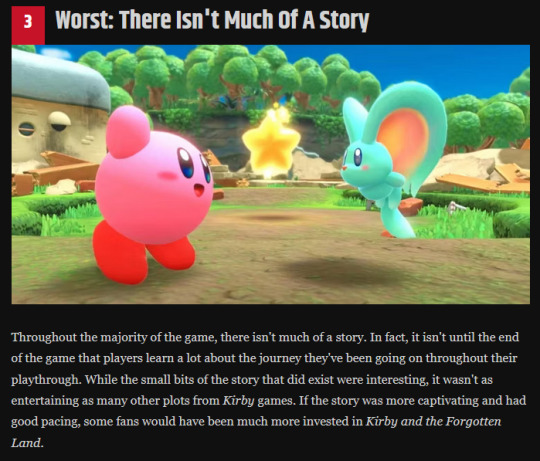
I won't argue for if the game should have had more constant and involved cutscenes like Robobot or Star Allies, but what I will say is that this game is VERY rich in story through the world design. The Forgotten Land as opposed to say the Land of the Sky in TD or the entire galaxy of Star Allies is like, DROWNING in writing and narrative. It builds so much mystery and intrigue through the theming of every world and even individual levels, with exploring both how the people of the land originally lived and how it's being reclaimed by nature and the animals.
I think the closest things maybe is Robobot and Halcandra in RTDL, the former having great little designs that key you into WHAT Haltmann is doing and what makes it so toxic. Halcandra though is the ultimate grand-daddy, the contrast between it and the Lor, and Egg Engines and Dangerous Dinner is full of theming and clues about the nature and history of the planet. AND THAT IS STORY, THAT IS WRITING! Especially when compared to say Star Allies, where most of the levels of the levels are just ye average Kirby themed fluff with little to say about the Jamba or the state they've left the galaxy in.
But when you play through the casino levels of Robobot, as well as delightful theming and level design, you see that Haltmann is erecting literally the most predatory entertainment centers imaginable. When you step off the sleek futuristic Lor into the scrapyards and wastes of Halcandra, you get fun intimidating final worlds, and a good grasp on *why* the people who made the Lor aren't around anymore, and may even start questioning why Magolor made such a great fuss of dragging you to this horrible place.
Music is also deeply important to this storytelling. Each of the factories/towers erected in ever world of Robobot's theme is a remix usually of themes related to older mechanical levels, subtly clueing you into where Haltmann go their technology from. Outside the Lor rather than the comfortable motif of Green Greens is this almost comically suspicious and disoriented theme once you're stuck on Halcandra and returning to Magolor with more doubts about his words. The final level inside of the volcano house a theme that is teasing the twist to come, and the theme for fighting Landia before the big reveal is less triumphant, and more majestic and pensive. Possibly trying to evoke more hesitance than confidence, even if most people wouldn't catch on to that on a first run.
But the cooler thing, is that while Robobot has this cool theming at key levels, and RtDL does at the end, this type of shit is pervasive ALL throughout Forgotten Land. Every world and nearly every level is a unique, well thought-out set piece! You get to see abandoned towns, cities, malls, stores, factories, resorts, and an amusement park, each which serves as more than just a fun location, but a clear picture of the world and the state its in. This intent is made clearer through the music and tone that goes out of its way to not highlight the destruction of these areas but their beauty, wonder, and mystery through the eyes of an clueless animals and our favorite pink alien.
The abandoned Alivel Malls theme is a track as upbeat and peppy as what must've played over it's speakers in it's hayday, because the hustle and bustle breathed back into it by the animals and Kirby just exploring this mysterious complex is just as lively. The theme of the Everbay Coast is peaceful and sunny despite the Holine ruins because it's as part of the scenery to the animals and Kirby as the picturesque palms and sands. And Wondaria!!!!!!!!! OMG WONDARIA WHERE TO EVEN BEGIN WITH EVERY FUCKING LEVEL AND THEME IN WONDARIA!!!
THIS IS WHY I CAN'T TAKE THAT CLAIM SERIOUSLY - y'know when I cried at Forgotten Land? In world 3. Not because of a cutscene or a line of dialogue, but just from the sheer emotion the setting evoked in me. The sweet, laid-back, starry-eyed wonder that it expressed from Kirby mixed with my own sense of nostalgia being aware of what that place was, and how beautiful it was to see it rediscovered and adored by Kirby and the animals of the Forgotten Land. It evokes such a strong feeling of bittersweetness, of existential dread comforted by the knowledge that the simple joys and memories we create places like amusement parks to share will continue on as long as there is life in the world.
And unlike some of my musings about past games, this was explicitly intentional. What truly brought the tears to my eyes was remembering an interview where the devs were explaining how they were trying to keep the tone light and Kumazaki said specifically they wanted to evoke peace and beauty rather than loss.
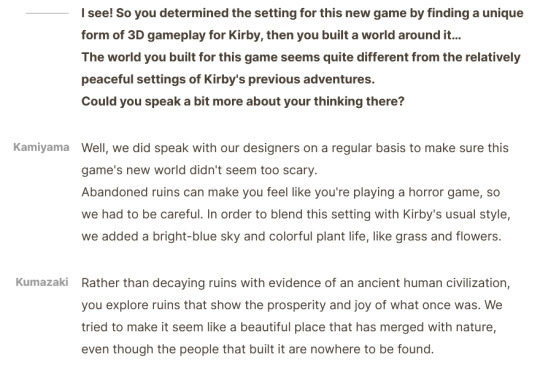
LIKE THIS IS WRITING! This is storytelling, this is intention. It's just subtle, but not at all unimportant, and it ties into the more overarching plot. It raises the question constantly of where the people went that is answered by Forgo, and expresses the dichotomy between the simple innocence of the animals compared to the ambitions of the people who abandoned them and that is now possessing their leader. It creates stakes for Elfilis and Forgo's intentions to destroy everything so beautiful and pure about the current world, but as it absolves the current world of guilt, it puts into perspective JUST HOW LONG Forgo must have been locked away that things changed so much. And as softly as the exploits of the original people are portrayed by the game, knowing their treatment of Eliflis and Forgo as a thing of entertainment and tool for innovation is sickening placed in contrast with it.
Like back to Wondaria, the way it shows how much space travel must have pervaded the imagination and escapism of the people either before or after Forgo's arrival is insanely smart. And it gives me chills in the best way seeing Kirby run around images of cartoon aliens from a civilization who would never meet him. Of Kirby, Elfilin, and Bandana sticking their head into a cardboard cutout of an astronaut meeting an alien, with the text "wish you were here" above in a script they don't even understand. A SCRIPT THE WRITERS MADE FOR THIS GAME SO THAT THEY COULD ADD MESSAGES LIKE THAT INTO THE WORLD FOR KEEN PLAYERS TO NOTICE AND MAKE CONNECTIONS.
Like it's insane. The dedication the Hal Labs has to stuff like this is maddening! It's so sweet and heartfelt and crafty, I'm so pissed off how little respect it gets because people don't understand visual storytelling!!!!! Saying Forgotten Land is light on story is preposterous, it might just be one of the most finely crafted stories the series has had to date, and is just a really solid piece of science fantasy writing in general honestly. It is packed with environmental storytelling that drives me Up The Fucking Wall, Man.
#kirby#kirby and the forgotten land#katfl#elfilis#forgo#kirby lore#shut the heck up#media analysis#GRAAAAAAAAAAAAAAAAAAAH (i love kirby)#im in my “writing is more than text” essay warrior era#this is part of me collecting stuff for a bigger essay though :3c i just got so distracted by this take#also i started this cause i though this article was from a bigger outlet than it was#so now i feel like my intensity is unjustified but idrc cause as i said: warrior essay era#OO ALSO I MISSED TALKING ABOUT THE LATER WORLDS#THE CITY IN WINTER HORNS FEELS LIKE A BIOME THE DELAPADATED RESORTS OF WASTES ARE NOW OASES IN A DRIED UP TROPICS-#-AND THE FUCKING CITYSCAPE OF REDGAR FLOODED WITH LAVA IS LIKE ITS OWN PART OF THE MOUNTAIN ITS SO BEAUTIFUL#its a fun twist on the typical final lava world that also gets to do double duty with evil industrial looking shit ARGFDSH so cool#tag talking
126 notes
·
View notes